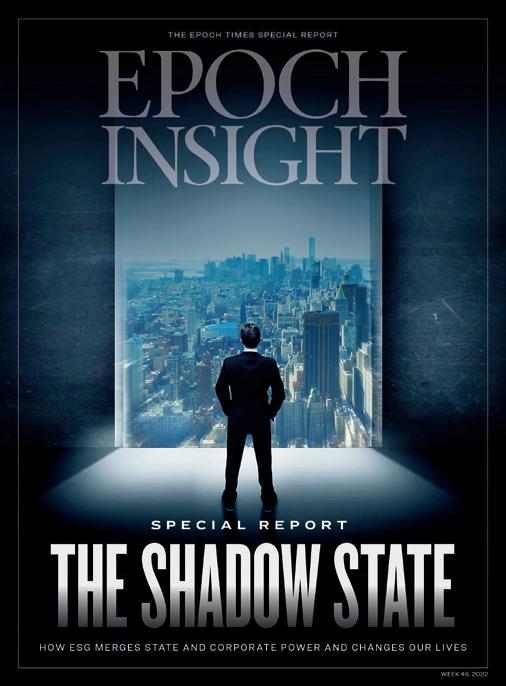WHO RUNS THE NATIONAL ARCHIVES?

 By Nathan Worcester
By Nathan Worcester


 By Nathan Worcester
By Nathan Worcester
classified documents seem to be popping up everywhere at the moment— former President Donald Trump, President Joe Biden, and former Vice President Mike Pence all have discovered documents, or in the case of Trump, been subject to a highly publicized FBI raid for them.
The National Archives and Records Administration (NARA) is the formal keeper of the federal government’s records, and it can refer potential mishandling of documents to the Department of Justice (DOJ).
Republican lawmakers are taking a look at potential bias at the NARA after its referral to the DOJ ultimately led to the raid on Trump’s home.
Lawmakers are also looking at why the records agency kept quiet until long after the 2022 midterm elections about the classified documents found from Biden’s time as vice president at both his home and his office at a think tank.
In this week’s edition of Epoch Insight, Epoch Times reporter Nathan Worcester reports that NARA’s acting head, the top attorney, and the nominee for the top post have a history of alignment with liberal ideology—leaving open the possibility of partisan influence on agency discretion.

Read Epoch Insight’s in-depth report to find out more about the backgrounds of the people running the National Archives.
Jasper Fakkert Editor-in-chiefThe National Archives has been at the center of recent revelations of former top officials allegedly storing classified documents at home. In this week’s edition, we take an inside look at the organization.
JASPER FAKKERT EDITOR-IN-CHIEF

CHANNALY PHILIPP
LIFE & TRADITION, TRAVEL EDITOR CHRISY TRUDEAU MIND & BODY EDITOR
CRYSTAL SHI HOME, FOOD EDITOR
SHARON KILARSKI ARTS & CULTURE EDITOR
BILL LINDSEY LUXURY EDITOR
FEI MENG ILLUSTRATOR
SHANSHAN HU PRODUCTION
CONTACT US THE EPOCH TIMES ASSOCIATION INC. 229 W.28TH ST., FL.7 NEW YORK, NY 10001

SUBSCRIPTIONS
READEPOCHINSIGHT.COM
GENERAL INQUIRIES, LETTERS TO THE EDITOR HELP.THEEPOCHTIMES.COM
ADVERTISING
ADVERTISENOW@EPOCHTIMES.COM
(USPS21-800)IS PUBLISHED WEEKLY BY THE EPOCH MEDIA GROUP, 9550 FLAIR DR. SUITE 411, EL MONTE, CA 91731-2922. PERIODICAL POSTAGE PAID AT EL MONTE, CA, AND ADDITIONAL MAILING OFFICES. POSTMASTER: SEND ADDRESS CHANGES TO THE EPOCH TIMES, 229 W. 28TH STREET, FLOOR 5, NEW YORK, NY 10001.
30 | 2nd Amendment
Ninety-four of 102 county sheriffs in Illinois have taken a stand against new gun laws.
32 | Tracking Firearms
Some states are moving to ban credit card companies from tracking gun sales.
38 | Sexual Misconduct
In Chicago public schools, there have been 1,735 sexual misconduct cases in four years.
44 | Culture War
The progressive movement is expanding in legal education institutes.
58 | Tax Cuts
Republicans are no longer united behind a strong tax-cutting plan.
59 | Arbitrary Detention
China’s communist regime has wrongfully arrested 200 Americans.
60 | Real Estate
Homeownership could be a good inflation hedge in the long run.
61 | US Economy
A Fed study shows inflation hits the poor, young, and uneducated.
62 | Economic Policies
The longer inflation remains elevated, the worse the economic outcome.
14 | ESG Movement
Some see an ideal future, others see a threat to their livelihood and traditional values.
22 | Mandating Masks
Israeli medical experts say there was “no justification” for masks during the pandemic.
34 | Pay
States are moving toward a user-based road tax, tracked by an installed device.
48 | National Archives
Background reviews of top officials support allegations of bias.
Survivors of the Auschwitz concentration camp and families gather to lay wreaths honoring victims of the Nazi regime on the International Holocaust Remembrance Day at the former Auschwitz I site in Oswiecim, Poland, on Jan. 27.

63 | Russia–China Relations
As Russia lacks capital, China may take over the development of Siberia.
64 | Enes Freedom
A big man, a big heart, and a warrior for speaking out.
68 | Control Your Ego
Accomplishments are great, but excessive selfpride is not.
70 | Classic Tuscan Style
This Tuscan-style farmhouse enjoys a tranquil setting in Florida.
72 | Houston’s Secret
The Four Seasons Houston is much more than just another hotel.
75 | Back to His Roots
Chef Boulard chose his California hometown for his new restaurant.
76 | Fly Like a Bird
When used safely, drones are a fun way to see the world from above.
79 | Classic Games
Some of these games date back many years, and provide great low-tech fun.
83 | Online Etiquette
How to make a good online impression at work or on your own time.




10.9 MILLION
The Public Interest Legal Foundation says that 10.9 million out of a total of 22.1 million ballots that had been mailed out to California registered voters during the 2022 midterm elections went “unaccounted for.”
35,000 ACCOUNTS
Some 35,000 PayPal user accounts have been hacked by a method known as “credential stuffing,” resulting in exposed names and Social Security numbers, according to a government website.
$14–19 PER HOUR


Walmart, the largest U.S. employer, told CNBC that it’s raising the pay of store workers to $14 to $19 an hour starting in early March, from the current $12 to $18.
$400 million
The U.S. Department of Transportation has announced it will be spending $400 million on upgrades and safety measures for California’s Golden Gate Bridge.
25% — In the fourth quarter of 2022, 24.6 percent of Redfin homebuyers looked to move to a different metropolitan area owing to home affordability issues, with places such as Sacramento, California; Las Vegas; and Phoenix topping the list of destinations.
“TikTok is China’s backdoor into Americans’ lives.”
“There’s more and more people in Congress that are understanding how important Taiwan is, and how important it is that we recognize Taiwan.”Sen. Josh Hawley, as he introduced a proposal to ban the video-sharing app in the United States.
DOCUMENTS WITH classification markings were found at Mike Pence’s home, lawyers for the former vice president say.
A “small number of documents” marked classified were found on Jan. 16 at Pence’s home in Indiana, Greg Jacob, one of the lawyers, informed the National Archives and Records Administration in a letter obtained by The Epoch Times.
PRESIDENT JOE BIDEN has confirmed that the United States will send M1 Abrams tanks to Ukraine as Kyiv’s conflict with Russia nears its one-year anniversary.

The president said during a White House announcement that the United States will send 31 tanks, adding that the “U.S. and Europe are fully united.” He reiterated that the tanks are “not an offensive threat to Russia.”
Previously, U.S. officials said that the M1 Abrams systems are too complex to operate and maintain, while adding that it would take months to get the tanks to Ukraine. It will take months to train Ukrainians to operate them.
Germany also confirmed that it will send 14 of its high-tech Leopard tanks to Ukraine.
AN ELEVATED RATE of Bell’s palsy was identified among elderly people after vaccination with a Pfizer booster shot, U.S. regulators said in a study.

The “small but statistically significant elevation” in facial paralysis was detected after vaccination with Pfizer’s old booster, which is no longer available in the United States, researchers with the U.S. Food and Drug Administration said in a preprint study.
The elevated rate resulted in an adjusted incidence-rate ratio of 1.13 and remained consistent when researchers adjusted for different factors, such as prior COVID-19 infection.
A rate above one shows a possible connection between the vaccine and an adverse event.
The discovery came when Pence engaged outside counsel to review the records stored at the residence, according to the former vice president’s team. Pence opted for the review after learning classified documents were found at one of President Joe Biden’s residences.
THE DEPARTMENT OF JUSTICE
and eight states have filed a lawsuit against Google, calling for the breakup of the firm’s ad-technology business and alleging that it’s engaged in monopolistic practices.
“Google abuses its monopoly power to disadvantage website publishers and advertisers who dare to use competing ad tech products in a search for higher quality, or lower cost, matches,” the Justice Department said in a complaint filed in a federal court in Virginia.
The lawsuit is the second federal antitrust complaint filed against Google, alleging violations of antitrust law in how the company acquires or maintains its dominance. The DOJ lawsuit filed against Google in 2020, which focuses on its monopoly in search services, is scheduled to go to trial in September.
TAIWAN’S MILITARY detected four Chinese aircraft and three naval vessels near the island nation, Taiwan’s defense ministry said, just two days after President Tsai Ing-wen wrote a letter to Pope Francis.
There was no indication that the aircraft crossed the Taiwan Strait median line or into Taiwan’s airspace, according to the ministry.
Taiwan’s military responded by deploying aircraft, navy vessels, and land-based missile systems to monitor the Chinese military’s activities.
THE UNITED STATES would likely run out of critical munitions during a major conflict with China’s communist regime due to its inability to adequately mobilize the defense industrial base, according to a new report.
The report, titled “Empty Bins in a Wartime Environment,” examines how the United States has depleted its key arms reserves by supplying Ukraine’s resistance against Russian invasion, and extrapolates how a similar situation could negatively affect the nation in a wartime scenario.
“The U.S. defense industrial base is not adequately prepared for the competitive security environment that now exists,” the report says.
“In a major regional conflict—such as a war with China in the Taiwan Strait— the U.S. use of munitions would likely exceed the current stockpiles of the U.S. Department of Defense (DoD), leading to a problem of ‘empty bins.’”


THE WORLD HEALTH ORGANIZATION (WHO) said it’s investigating contaminated cough syrups that were blamed in the deaths of hundreds of children. Over the past four months, more than 300 children have died after taking over-the-counter cough syrups, the WHO said in a statement. Most of the victims were under the age of 5 and lived in Gambia, Indonesia, and Uzbekistan.
The medicine in question has been confirmed or suspected to contain high levels of diethylene glycol and ethylene glycol, which can cause acute kidney injury when ingested.
“These contaminants are toxic chemicals used as industrial solvents and antifreeze agents that can be fatal even taken in small amounts, and should never be found in medicines,” the WHO stated.
The CCP’s latest show of force came after Tsai told the spiritual leader of the world’s Catholics in a letter that constructive interaction with China is only possible if the Chinese Communist Party respects Taiwan’s democracy and freedom.
TURKEY APPEARS TO have thrown cold water on a joint bid by Sweden and Finland to become members of the Western military alliance.
Turkish President Recep Tayyip Erdogan has said Sweden can “no longer expect” Turkish support for its NATO accession efforts.
As a NATO member, Turkey wields veto power over bids by new countries to join the Western-led bloc.
Erdogan’s remarks came a day after activists staged a contentious rally outside Turkey’s embassy in Stockholm. At the event, a copy of the Koran was burned by Rasmus Paludan, a right-wing politician known for courting controversy.
Turkey’s foreign ministry called the move an “act of provocation” and canceled a planned visit to Ankara by Sweden’s defense minister.








1. Visitors attend an opening ceremony celebrating the National Tulip Day at the Museumplein park in Amsterdam on Jan. 21.

2. People cross the street as it snows in Toyama, Japan, on Jan. 24, as parts of the country brace for a severe winter storm.

3. An Afghan boy carries drinking water canisters filled from a stream in the Dara-i-Nur district on Jan. 23.

4. Members of the Sealed Knot, which is dedicated to costumed reenactment of battles and events surrounding the English Civil War, stage their 50th reenactment of the Battle of Nantwich, a battle which took place near the town in 1644, in northwest England, on Jan. 21.

5. Kyrgyz riders compete during the Alaman-Ulak traditional national horse game outside the village of Dacha-Suu on Jan. 21. In this national sport, players grab a goat or a calf carcass from the ground in full gallop and try to throw it in the place indicated by the judge.
6. School girls perform the Punjabi folk dance “Giddha” during a fulldress rehearsal ahead of the Republic Day celebrations, in Amritsar, India, on Jan. 24.





A solar panel range in what was once a field used for agriculture, in Huron, Calif., on July 23, 2021.

Charlie Masters, a farmer in Kentucky, has watched the prices rise.
Diesel fuel and nitrogen fertilizer, two of the most critical ingredients for running his Fleming County beef and produce operation, are still costlier than just two years ago. That’s partly due to recent fluctuations in the prices of oil and natural gas.

What’s behind those trends?
“I’m sure there are other market forces at work—we can all blame Putin or somebody—but I put a lot of the blame on ESG,” Masters told The Epoch Times in a Dec. 8, 2022, interview.
ESG stands for environmental, social, and corporate governance, an investing approach that has picked up steam in the past few years.
Its defenders argue that ESG criteria help investors respond to risks and opportunities that traditional financial metrics ignore—for example, long-term challenges with drought, fire, and flooding that many scientists link to greenhouse gas emissions.
Top asset managers such as BlackRock, Vanguard, and State Street have taken the lead on ESG, alongside many of the country’s biggest banks.
Yet critics worry ESG distorts the market by politicizing financial decisions. The problem, they say, was most acute over the past two years, when Democrats controlled both houses of Congress as well as the presidency.

“It was particularly egregious in the first few months of the Biden administration, when there was a clear market signal, and a message sent by the administration, that they were doing everything they could to discourage any longterm investment in oil and gas,” Tim Stewart, president of the fossil fuel industry group U.S. Oil and Gas Association, said in a Jan. 5 interview with The Epoch Times.
ESG skeptics argue that the paradigm has made it significantly harder for coal, oil, and natural gas companies to finance new mining and drilling.
Jackie Haney, CEO and managing partner of the energy-focused private equity firm UnionRock, is one of many in her industry who have had to adjust to shifting views from big investors.
She had to deliver many more presentations to finance UnionRock’s second private equity fund than she did while raising capital for its inaugural fund.
In a Jan. 5 interview with The Epoch Times, she said she thinks multiple factors made investors more wary during her second effort at fundraising, including relatively poor results from similar upstream and midstream investments in the past.
The only divestment she could directly trace to ESG came from university endowments, many of whose boards have recently voted to stop funding fossil fuel companies.
“[The ESG movement] is taking place in boardrooms and drab government office buildings, and behind closed doors with some of the most influential people on the face of the planet.”
Riley Moore, West Virginia state treasurer
Yet, in recent months, prospects have brightened.
Haney predicts that her next fundraising round won’t require nearly as many presentations as her second effort did–and even as energy prices slide, she doesn’t think production will come to a screeching halt.
“Even though there is some sentiment that commodity prices may soften this year, the general consensus is that producers will still be able to operate out of free cash flow and [that] returns in public and private equities will still be robust and ripe for investment within the sector,” she said.
Beyond the ‘E’ in ESG
Following the ascent of ESG in the private sector and ESG-like policies from the federal govern-
ment, Republican officials from states across the country have struck back. They’ve worked together to defend an industry long aligned with their party.
Yet, according to those politicians, ESG threatens much more than the prosperity of fossil fuel-producing states.
To some, ESG makes visible a larger effort to yoke together the public and private sectors. On that view, the movement serves radical goals–ones it can’t achieve through the democratic process alone.
“This isn’t your typical revolutionary activity,” West Virginia state Treasurer Riley Moore said in a Dec. 2, 2022, interview with The Epoch Times.

“This is taking place in boardrooms and drab government office buildings, and behind closed doors with some of the most influential people on the face of the planet,” he said.
“This is very, very top down, rather than some type of grassroots movement.”
“The ‘S’ is sort of the Brave New World next step in ESG,” Kentucky state Treasurer Allison Ball said in a Nov. 29, 2022, interview with The Epoch Times.
“It’s taking investment and making it ideological.”
In line with that phenomenon, ESG’s “social” side has encompassed the push for “racial equity audits” of large companies, often from ESG-oriented asset management firms that use shareholder proposals to advance political aims.
That enthusiasm can be traced back to the death of George Floyd at the hands of Minneapolis police in 2020, when a socially acceptable, borderline socially compulsory form of racial advocacy quickly gained momentum. As protests, riots, and violent crime rocked the country, American corporations pledged billions of dollars to causes they expected would burnish their image.
Many influential companies, including McDonald’s and Microsoft, have already carried out racial equity audits, often administered by third-party companies.
In 2022, an ESG fund launched by the firm Trillium Asset Management proposed a third-party racial equity audit of the insurance company Travelers–one of many U.S. companies that donated to race-based organizations after Floyd’s death.
“To combat systemic racism, corporations should recognize and remedy industry–and company-specific barriers to everyone’s full inclusion in societal and economic participation,” the shareholder proposal read. It argued that Travelers’ non-white policyholders could be treated differently than its white customers.
“I put a lot of the blame on ESG,” Kentucky farmer Charlie Masters says.
Kentucky state Treasurer Allison Ball doesn’t believe that a turn away from coal and other fossil fuels would serve the interests of her state.
In their recommendation against the proposal, Travelers’ Board of Directors claimed Trillium’s plan would “[conflict] with the Company’s longstanding practice not to take race into account in its underwriting and pricing decisions.”
The proposal narrowly failed, winning 47 percent of shareholders’ votes.
Utah Attorney General Sean Reyes, one of many state-level Republicans fighting ESG, told The Epoch Times he thinks the failed shareholder resolution violated the laws of numerous states.
“As a person of color, I know that there’s discrimination out there. I’ve experienced it–in some cases, significantly. Is there inequality in different sectors? I do believe that’s true. But there are other ways to address that than to force an insurance company to start breaking the law,” he said in a Dec. 21, 2022, interview.
Trillium, for its part, has pointed out that the Biden administration’s Securities and Exchange Commission (SEC) couldn’t conclude that Trillium’s racial equity audit proposal to Travelers would violate state law.
That same agency delivered a significant victory for the “governance” side of ESG in August 2021 when it approved NASDAQ’s board diversity and disclosure rules.
Because of the decision, NASDAQ is poised to require most companies it lists to “have or explain why they do not have a minimum of two diverse board members.” At least one of those “diverse” members must self-identify as female. In addition, at least one must self-identify as either LGBT or an underrepresented minority.
“‘Diverse’ means an individual who self-identifies in one or more of the following categories:
Female, Underrepresented Minority, or LGBTQ+. ‘Female’ means an individual who self-identifies her gender as a woman, without regard to the individual’s designated sex at birth,” NASDAQ’s rules state.
By NASDAQ’s definition, then, heterosexual white men who don’t see themselves as transgender cannot be “diverse.”
That SEC decision has been challenged in court by Alliance for Fair Board Recruitment. Reuters expects the 5th Circuit Court of Appeals to deliver an important ruling on the case this year.
In Kentucky, the state treasurer has lent her voice to the chorus of state-level officials speaking out against ESG.
During her interview with The Epoch Times, Ball reflected on her deep roots in her state’s rugged eastern half.
“I’m ninth generation from the mountains, the Hatfield-McCoy area. I’ve got generations of relatives who’ve been coal miners,” she said.
“So my radar really shows up when those industries–the coal, oil, and gas industries–are being harmed or targeted.”
Like other state-level Republicans from across the country, she has sought to use her control over public pension money as leverage against ESG activism.

On Jan. 3, Ball released a list of financial institutions accused of boycotting energy firms. That’s in line with the requirements of a new state law, similar to statutes passed elsewhere in the United States.
If the companies don’t change their policies within three months of the list’s publication, state governmental entities will, in most cases, have to divest from them. Some carve-outs remain, including for governmental entities that have “suffered or will suffer a material financial loss” by dint of divestment.
State treasurers typically have a straightforward fiduciary duty concerning the funds they oversee: They must serve the interests of those funds’ beneficiaries.
Utah state Treasurer Marlo Oaks told The Epoch Times on Nov. 14, 2022, that ESG may undercut that legally binding obligation.
“To the extent that investment managers have adopted a political agenda—or an agenda that is elevated to the same level as the fiduciary obligation that we have—we then have a dual mandate at play and we cannot entertain that dual mandate legally,” he said.
Reyes likened asset managers’ fiduciary responsibilities to the prime directive from Star Trek.
“That is kind of sacrosanct, right? It’s almost
Vehicles pass the Phillips 66 Los Angeles Refinery Wilmington Plant in Wilmington, Calif., on Nov. 28, 2022.

ESG skeptics argue that the paradigm has made it significantly harder for coal, oil, and natural gas companies to finance new mining and drilling.
this sacred duty,” he said.
Reyes fears the spread of ESG and similar activist philosophies “deconstructs the whole idea of a fiduciary.”
“How can an average American feel comfortable and good?” he asked.
There’s an additional wrinkle to fiduciary duty in the Bluegrass State.
“In Kentucky, we have another obligation, and that’s to promote the industry and economy of Kentucky,” Ball said.
Indeed, KRS 61.650 directs the board for the Kentucky Employees Retirement System or its State Police Retirement System to “give priority to the investment of funds in obligation calculated to improve the industrial development and enhance the economic welfare of the Commonwealth [of Kentucky].”
“That definitely means an eye toward signature industries like coal and oil and gas,” Ball said.
In a 2022 opinion requested by Ball, Kentucky Attorney General Daniel Cameron found that ESG practices among investment managers conflict with those firms’ fiduciary duties when handling the state’s public pension money.
“It brought some clarity hearing that from the attorney general,” Ball said.
Obama-Era Memories Fuel ESG Skepticism
Opponents of coal, oil, and natural gas, who often count themselves among the champions of ESG, have a different narrative regarding the futures of Kentucky and similar states.
Those energy sources, they contend, are so environmentally damaging that they must be rapidly replaced as part of an energy transition to solar, wind, and other alternatives.
On that interpretation, the economic role of fossil fuel production in Kentucky and its neighbors could be supplanted by something like hydrogen.
Indeed, both of West Virginia’s senators supported a proposed “Appalachian Regional Clean Hydrogen Hub” in a September 2022 statement from Sen. Shelley Moore Capito (R-W.Va.)
An initial 2021 report from the Biden administration’s Interagency Working Group on Coal and Power Plant Communities and Economic Revitalization recommended heavy federal spending in Appalachia and other regions
Trucks driving at a coal mine in Lost Creek, Ky., on Sept. 29, 2022. Kentucky’s state treasurer has joined the chorus of statelevel officials speaking out against ESG.

traditionally reliant on coal mining, “given the expected near-term declines in coal production and generation from coal power plants.”
Ball doesn’t believe that a turn away from coal and other fossil fuels would serve the interests of her state.
“Right now, there really isn’t an alternative,” she said, noting recent increases in food and energy costs.
West Virginia’s Moore has a similar point of view about the coal industry in his state.
In his Dec. 2, 2022, interview, Moore said his state had suffered through a “War on Coal” during the Obama administration, because of actions by administrative agencies under the executive branch.
Thousands of West Virginians lost high-paying coal mining jobs during those years.
“Total coal production in West Virginia peaked in 2008 at nearly 158 million short tons then declined to around 80 million short tons in 2016,
a nearly 50 percent decline,” West Virginia University researchers wrote in 2018.
“We took a major, major hit there,” Moore said.
He argued that the promise of abundant new green energy jobs in West Virginia during that period ultimately went unfulfilled.
Moore, like Ball, has taken a leading role in Republican state officials’ response to ESG.
In 2022, he issued his own list of financial institutions allegedly boycotting energy companies.
Both West Virginia’s Moore and Utah’s Oaks drew attention to what they see as a particularly insidious dimension of ESG–namely, its potential future impact on a state’s ability to secure credit.
In April 2022, Oaks and other Utah officials wrote a letter to S&P Global Ratings, objecting to its inclusion of “ESG credit factors” alongside conventional credit ratings for states and other political entities. Utah scored relatively poorly on ESG, notwithstanding its AAA credit rating.
The letter voiced concern that adding ESG factors could “unfairly and adversely affect Utah’s credit rating and the market for Utah’s bonds, especially where the alleged indicators are not indicative of Utah’s ability to repay debt.”
“Utah has a pristine credit rating,” AG Reyes told The Epoch Times in his Dec. 21, 2022, interview.
“All of a sudden, if you throw in ESG standards, which don’t affect the traditional metrics, it could drastically alter the state’s ability to bond–to be able to work on projects and issues critical to the citizens of the state.”

“As a person of color, I know that there’s discrimination out there. ... But there are other ways to address that than to force an insurance company to start breaking the law.”
CLOCKWISE FROM TOP L: DREW ANGERER/GETTY IMAGES, MICHAEL M.SANTIAGO/GETTY IMAGES, DIANE DESOBEAU/AFP VIA GETTY IMAGES
In response to that letter, S&P Global Ratings’ Eden Perry wrote that the firm’s ESG factors “simply provide additional transparency on those ESG credit factors that are already incorporated into our credit rating analysis.”
“We’re likely going to face a downgrade in our bond rating, because of an ESG score that has nothing to do with the finances in the State of West Virginia whatsoever,” Moore said.
“And so, now it’s going to cost us more money to build roads, hospitals, schools, all of these public projects that are so important to our people, because of a ridiculous score that’s made up.”
Moore, who recently announced his 2024 run for Congress, is the grandson of the late West Virginia Gov. Arch Moore, and the nephew of Sen. Moore Capito.
Those in the oil and gas industry are among Moore Capito’s top donors according to Open Secrets. However, people in that sector donated less than people working in securities and investment, leadership political action committees, and retired individuals.
Farmer Masters, for his part, doesn’t have any family connection to the coal industry. Like Ball and Moore, though, he does have a multigenerational link to the place he calls home.
His parents acquired the land he currently works during the 1950s—”when I was just a tyke,” he said.
Ball and Masters sounded similar when describing the threat to agriculture posed by ESG. The cost of food has a lot to do with the cost of fertilizer. That, in turn, has a lot to do with the natural gas market.
“The big story that I hear, that I hear repeatedly, is the cost of fertilizers, and the way that’s impacting corn, wheat, and even the cost of eggs. A lot of things are produced by farms,” Ball said.
“Nitrogen fertilizer is essential,” Masters said.
Some financial giants have backpedaled from ESG and similar policies in recent months.

In early December 2022, for example, Vanguard left the United Nations-affiliated Net Zero Asset Managers (NZAM) Initiative.
“This HUGE WIN demonstrates that we are turning the tide against the woke radicals who are trying to impose their social & environmental agenda on our economy through coercive means!” Moore wrote on Twitter in response to the move.
Stewart, of the U.S. Oil and Gas Association, thinks conditions in the global economy have forced Wall Street to reckon with the downside of aggressive ESG commitments.
“There’s nothing quite like a 30 percent drop in a NASDAQ investment portfolio, and having energy, particularly fossil fuel, being the only bright star in your entire investment portfolio for ‘22 to make people go, ‘You know what, maybe this is not such a good idea. Maybe we ought to have a little more exposure to oil and gas because apparently, they’re doing something right,’” he said.
Ball put it succinctly: “I think the market works. I think there’s a demand for energy, and that’s one reason why energy is doing well.”
“We’re seeing more and more investors coming to the realization that there shouldn’t be a binary approach to energy transition and that investment in hydrocarbons will continue to be viable for their portfolios,” said UnionRock’s Haney.
From his Fleming County farm, Masters was heartened to learn of Vanguard’s departure from the U.N. alliance.
“Maybe people are becoming more aware [of ESG] and the folks like Vanguard are having to react to pressure.”
ESG’s “social” side has encompassed the push for “racial equity audits” of large companies. The Biden administration’s Securities and Exchange Commission approved NASDAQ’s board diversity and disclosure rules in 2021. By NASDAQ’s definition, then, heterosexual white men who don’t see themselves as transgender can’t be “diverse.”
Protective masks are produced at a sewing workshop in Buenos Aires, Argentina, on April 7, 2020.
 PHOTO BY AMILCAR ORFALI/GETTY IMAGES
PHOTO BY AMILCAR ORFALI/GETTY IMAGES
Israeli medical experts say masks were mandated for psychological effect

There’s no scientific or medical basis for mandating that people wear masks in the general public and medical facilities to prevent infection from COVID-19 or other respiratory viruses, experts said in a letter sent to the Israel Medical Association Journal (IMAJ).

The letter, published in the December 2022 issue of the monthly journal, was written by Yoav Yehezkelli and Amnon Lahad. Yehezkelli is a specialist in internal medicine and medical management, a lieutenant colonel in the Israel Defense Forces, and one of the founders of the Epidemic Management Team and Evaluation Programs for Extreme Biological Incidents—a professional body that advises the director general of the Israel Ministry of Health (MOH). Lahad is chairman of the National Council for the Health of the Community and head of the Department of Family Medicine at the Hebrew University of Jerusalem’s
School of Medicine.
The letter, titled “Masks for Prevention of Respiratory Infections—Is It Evidence-Based Medicine?” addresses mask mandates, which remain mandatory in medical facilities in Israel.
Both authors are members of the Public Emergency Council for the COVID-19 Crisis (PECC), an independent organization made up of Israeli physicians, researchers, and social welfare professionals.
Before the COVID-19 pandemic, the existing available data about respiratory viruses including influenza and various types of coronaviruses showed that there’s no basis for wearing masks to prevent the spread and infection of a respiratory virus, Yehezkelli told The Epoch Times.
“All the studies done in the world until 2020 showed that there is no justification for this,” he said.
The guidelines of the World Health Organization (WHO) and the U.S. Centers for Disease Control and Prevention (CDC) also showed that there’s no need for wearing masks in the general public, Yehezkelli said.
The practice of wearing masks in Eastern countries had no professional justification, he said.
In 2020, the recommendation in Israel and around the world for wearing masks suddenly changed “without having any new professional support to confirm that it does indeed have effectiveness against respiratory infection,” according to Yehezkelli.
The authors of the letter wrote that “most of the studies on the subject during the epidemic suffer from low quality and many biases.”
Since the start of the COVID-19 pandemic, only two high-quality controlled studies were done, Yehezkelli said. One was done in Denmark and the other one was done in Bangladesh.
The study in Bangladesh found some marginal benefit for people older than the age of 50, but overall, both studies show “that there is no benefit in wearing masks to prevent infection with the coronavirus,” he said.
“That’s actually what I wrote in this review, that it doesn’t actually have a professional justification,” Yehezkelli said.
To the contrary, he noted, there are some studies that show that wearing masks might do some harm.
In the letter, the authors pointed to several observational studies that show that wearing masks can cause some harm, including headaches, concentration difficulties, shortness of breath, a decrease in blood oxygen levels, an increase in the level of carbon dioxide, bacterial contamination from the mask itself, and the existence of substances suspected of being carcinogenic as a result of a lack of regulations in the production of masks.
According to Yehezkelli, the accumulation of carbon dioxide—at levels that sometimes exceed the permitted standard—might cause tiredness, blurriness, sleepiness, and deficiency in judgment and thinking.
It might also cause communication problems for people with impaired hearing who need to lip-read, as well as for children. It’s important for children to
see a face for their language development, he said. Some studies show the negative effects of wearing masks on communication and children’s development.
According to a position paper published in March 2021 by the PECC, after an in-depth review of medical literature, the council recommended against the wearing of masks for children for extended periods “due to concerns for actual harm to their health and development.”
There’s a particular situation in which wearing masks is justified, according
People walk past a sign that reads “Face Mask Required” in a mall in Washington amid the COVID-19 pandemic on Dec. 21, 2021.
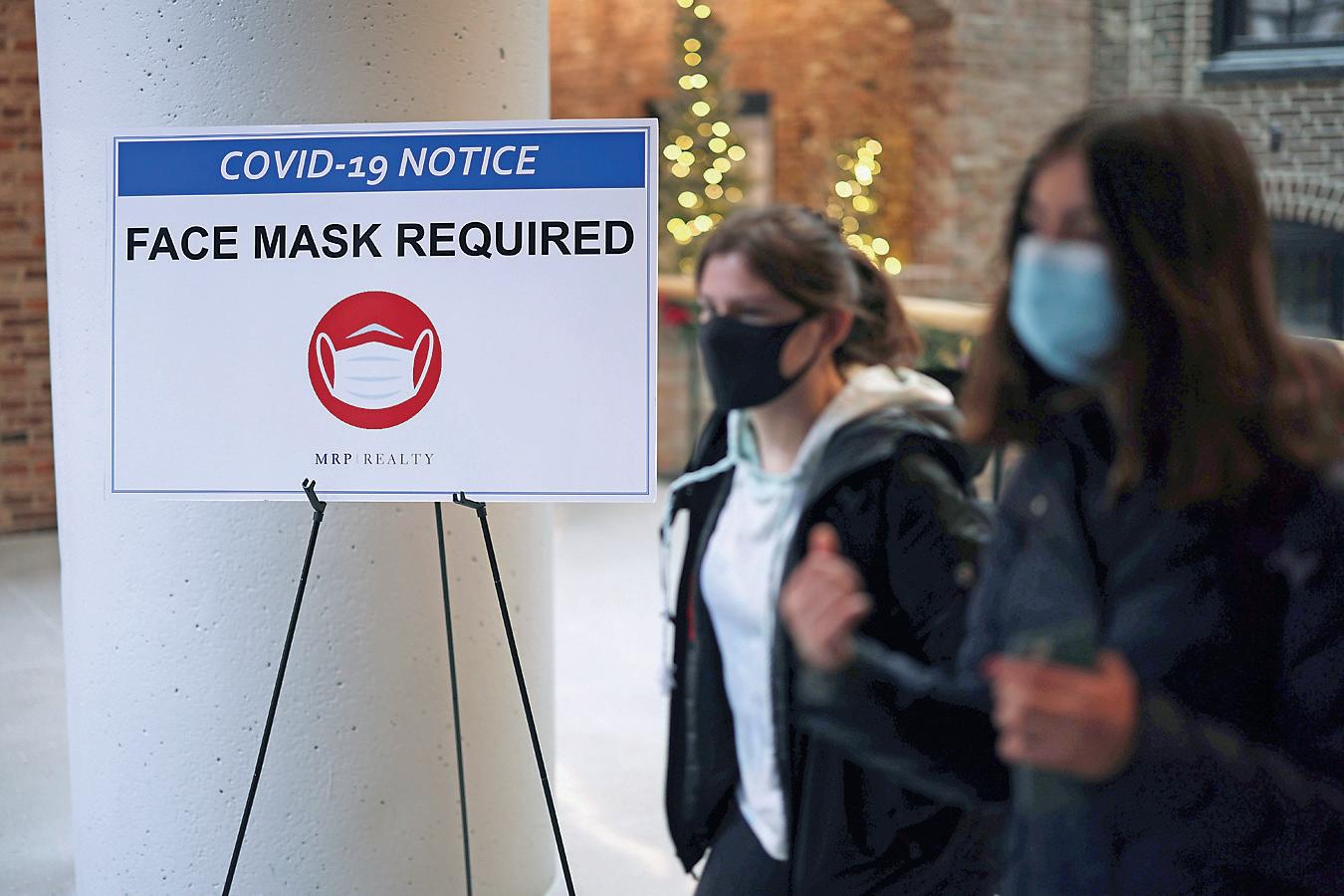
to Yehezkelli, who’s also a former lecturer at the Department of Emergency and Disaster Management at Tel Aviv University.
In the context of medical treatment, when a patient with respiratory disease is closely examined by medical staff, and certainly in the case of COVID-19, “there is justification for wearing masks by both the therapist and the patient,” he said.
As a doctor who has practiced in family medicine, Yehezkelli said, “When a patient comes to me with leg pain, there is no reason for him or me to wear a mask. If a patient comes in with anemia, there is no reason, either.”
In the medical encounter, the relationship that exists between the doctor and the patient has great significance, and masks interfere with that relationship and the empathy that should exist between them, he said.
Currently, there’s still a directive for wearing masks in medical, health, and welfare facilities in Israel, which “actually has no justification,” Yehezkelli said.
According to an existing webpage on the MOH’s website, the science behind wearing masks is settled.
“Although some try to make others doubt the effectiveness of masks, the scientific information concerning their effectiveness in preventing transmission of COVID-19 to others is well-founded and well-established!” the webpage reads.
“Many studies have shown that wearing masks in public settings significantly reduces the community spread of COVID-19, too.”
But Yehezkelli said the MOH recommendation is “incorrect information.”
“I will not hesitate to call it disinformation,” he said.
Most of the studies that the MOH are relying on are observational studies.
“In medicine, we try to rely on controlled studies, which are of higher quality than observational studies,” Yehezkelli said.
Some observational studies show
Before the COVID19 pandemic, the existing available data showed that there’s no basis for wearing masks to prevent the spread and infection of a respiratory virus, specialist Yoav Yehezkelli says.
that the wearing of masks is beneficial and some show that it isn’t. But the controlled studies show that there’s no benefit.
“I think this is an example of the trending, misleading information provided both by the Israeli Ministry of Health and by health authorities around the world ... which was provided both to the public and to the professional public, including to us doctors,” he said.
“When you read these studies in depth and you read their methods, you realize that there is no justification and no effectiveness, in fact.”
The information given by the authorities about other measures taken to prevent the spread of COVID-19, such as lockdowns, closing schools, quarantines, and vaccines—including information about their effectiveness and safety— is also “very inaccurate information to say the least,” according to Yehezkelli.
The MOH didn’t respond to a request for comment.
Yehezkelli said he would expect the scientific and medical communities to follow evidence-based medicine rather than beliefs when deciding upon these measures or at least change these measures “over time and as more data have accumulated.”
Maybe these strict measures were initially taken by the authorities “to go a little on the safe side,” he said. But the data that soon became available showed that these strict measures had no professional justification, were ineffective, and ended up causing more harm than good.
“The wrong policy in response to COVID-19 caused, in my understanding, a disaster on a global scale,” Yehezkelli said.
Examples of this disaster include the loss of school years for children; anxiety and depression in the population as a
result of the isolation and lockdowns, mainly among youth who are still affected by it; an increase in cases of eating disorders; unemployment; and economic damage.
“I think we are still absorbing the shockwaves of the policy, not of the virus,” he said.
‘Educate
“The Ministry of Health’s outreach strategy throughout the epidemic was a strategy of intimidation,” which damaged the public’s trust, Yehezkelli said. In managing emergencies, the right strategy is to “give transparent, reliable information and recommendations for action.”
At the beginning of the pandemic, the epidemic management team in Israel concluded in its discussions that there’s no benefit to wearing masks, he said.


It’s noted in the team’s discussions that “the purpose of the masks is to educate the public,” according to Yehezkelli.
“I don’t think it is appropriate for some government body to educate the public in this way,” he said.
Following a freedom of information (FOI) application submitted by attorney Gadi Shiloh, a member of the PECC, the protocols of the discussions of the epidemic management team were released, dated March 30, 2020, and April 1, 2020.
“Wearing masks has an educational message as part of maintaining hygiene and social distancing,” and it has “a psychological effect,” the epidemic management team stated in its protocols.
It noted that “in the absence of professional or factual basis,” the team would have a hard time issuing a recommendation to wear masks.
“There is no established scientific proof that masks lower morbidity,” it stated.
“There is doubt about the effectiveness of using a mask to prevent infection.”
Yet one suggestion considered by the team was for the public to wear masks as a means to ease the lockdown policy. They noted that if this recommendation was to be made, it must be done together with “an explanation why this recommendation was made and that the public will be aware that there is no proof that it prevents infection.”
“It is important to make sure that wearing masks will not cause harm, and the harm may be greater than the benefit,” the team noted.
On April 7, 2020, the MOH decided to mandate that citizens wear a mask in public, an emergency order that came into effect five days later.
“The wrong policy in response to COVID19 caused, in my understanding, a disaster on a global scale.”
Yoav Yehezkelli, specialist
The authors sent the letter to the IMAJ in response to another letter that had been published in the journal’s July 2022 edition, which advocated the effectiveness of wearing masks.

The authors sent their letter to IMAJ in July 2022, and within a day, Yehezkelli received a message that it was approved for publication, he said.
Yet the letter was only published in the December 2022 edition, six months after it was sent.
When they tried to find out why the letter hadn’t been published in subsequent editions, they were told that it would take time. Later, they were told that the letter
needed some language editing.
In the end, “the letter was published as-is,” Yehezkelli said.
Not a single word had been changed.
Although the letter was eventually published, the delay may be an example “of some reluctance” in the medical press to publish articles “that advocate a different approach than the approach of the health authorities regarding the coronavirus,” he said.
The IMAJ told The Epoch Times in an email, “As usual, the letter went through a review process, and yes, the editorial work takes time.”
Yehezkelli, who’s also a consultant for a medical research institute called KI
Institute, said that “this is a very noticeable phenomenon” and that it’s difficult to publish studies in magazines around the world that “challenge the existing approach.”
According to Yehezkelli, “most leading medical press in the world, unfortunately, sinned during the COVID-19 period, and still sin” with the publishing of studies that support the institutional stance of health authorities and a reluctance to publish articles that show the opposite.
This noticeable trend is problematic because the medical profession relies on articles published in high-quality journals. In the past three years, “the bias in publications is very significant in medicine,” he said.
“I’m afraid the doctors are going through a kind of brainwashing by the medical establishment,” receiving inaccurate and misleading information, so the doctors themselves don’t know what’s right and what’s not, Yehezkelli said.
“The medical establishment has fallen into some kind of foolishness” in which there’s no longer any need to stop and examine things and draw lessons moving forward, “which is ultimately what’s important, that next time we will behave in a more rational way and based on facts and research,” he said.
“And perhaps most important of all,” the letter’s authors wrote, “the continued refusal to have an open professional discussion, and the disdain for different positions backed by research and data, are not consistent with norms in medicine and science, and this has long-term negative consequences for the medical profession—consequences that every doctor should be concerned about.”
In the past three years, ‘the bias in publications is very significant in medicine,’ specialist Yoav Yehezkelli says.

THE GROUNDS OF KINKAKUJI TEMPLE (the Golden Pavilion) after a snowfall, in Kyoto, Japan, on Jan. 25. Kinkakuji is a Zen temple whose top two floors are completely covered in gold leaf. It once belonged to the shogun Ashikaga Yoshimitsu. The temple has burned down numerous times throughout history; the present structure was built in 1955.
 PHOTO BY STR/JIJI PRESS/AFP VIA GETTY IMAGES
PHOTO BY STR/JIJI PRESS/AFP VIA GETTY IMAGES
Law bans ‘assault weapons’ and magazines that hold more than 12 rounds
By Michael Clementst least 94 of illinois’s 102 county sheriffs expressed disapproval of the Protect Illinois Communities Act signed by Gov. J.B. Pritzker on Jan. 11. Calhoun County Sheriff William Heffington told The Epoch Times that he isn’t concerned about Pritzker or the Illinois General Assembly’s views on firearms.
“I work for the people, not the government,” Heffington said.
According to Heffington, the law is unconstitutional and unnecessary, addressing crime by clamping down on law-abiding gun owners. The new law bans so-called assault weapons and magazines that hold more than 12 rounds of ammunition.
“I just don’t see anything in that bill that does anything to solve our problems,” Heffington said. “We need stiffer penalties on people that abuse the law.”
The majority of Illinois sheriffs agree with Heffington, says Jim Kaitschuk, executive director of the Illinois Sheriff’s Association. He pointed out that county sheriffs don’t answer to state officials as elected officials. So they’re generally freer to focus on the communities they serve.
Kaitschuk took issue with the contention that Illinois’s sheriffs were refusing to enforce the law. While the sheriffs’ actions may seem a bit rebellious, Kaitschuk said there’s more to enforcing the law than arresting people.
“If a police officer stops someone speeding and gives them a warning, isn’t that enforcing the law?” he said.
He said that all law enforcement officers are granted a certain amount of discretion. In addition, they’re sworn to uphold the U.S. Constitution and their state’s constitution. Kaitschuk said the sheriff—like anyone else in a similar
12 ROUNDS
THE PROTECT ILLINOIS COMMUNITIES ACT bans so-called assault weapons and magazines that hold more than 12 rounds of ammunition.
situation—is expected to use his best judgment to do what’s right when the constitutions appear to conflict.
“I don’t know why a sheriff should be different than anyone else,” Kaitschuk said. “Why shouldn’t they be able to say what they believe about any new law?”
Pritzker’s office and the office of Illinois Attorney General Kwame Raoul didn’t respond to telephone messages and emails seeking comment before press time. According to published reports, Pritzker gave one reason for signing the bill into law.
“This legislation will stop the spread of assault weapons, high-capacity magazines, and switches, and make our state a safer place for all,” he said.
The Illinois House approved the legislation on a final vote of 68–41.
Meanwhile, a judge ruled on Jan. 20 to pause the new assault weapons ban, granting a tempo-

rary restraining order to some as the new law’s legality is challenged. Effingham County Judge Joshua Morrison issued the order after Tom DeVore, a former Republican candidate for attorney general, sued to block the law.
DeVore is representing hundreds of people from dozens of counties who argue the law violates their constitutional rights.
Under the order, which took effect immediately, the ban won’t be enforced for a total of 866 plaintiffs; four of them are licensed firearms dealers, and the rest are state residents from 87 counties, including Cook.
The law defines a so-called assault weapon as a semiautomatic rifle that accepts a detachable magazine and features a pistol grip or thumbhole stock, a flash suppressor, a grenade launcher, a barrel shroud, or other features.
A semiautomatic pistol that accepts a detachable magazine or may be modified to accept one
has a threaded barrel, a second pistol grip, a flash suppressor, a barrel shroud, or other features also falls into this category, as do most AK- and ARstyle rifles. Also banned are .50-caliber firearms.
Banned firearms are grandfathered in under the law if the owners register them and pay a fee.

Illinois State Rifle Association President Doug Mayhall previously told The Epoch Times that gun registration is one of the law’s most objectionable aspects.
“Registration always turns into confiscation,” Mayhall said.
Under the measure, the term of an Illinois firearms restraining order (FRO) is extended to one year from six months. The list of persons who could ask the court for a FRO was also expanded. The measure increases the age to obtain a firearm owner identification card (FOID) to 21. People younger than 21 can currently receive a FOID if a parent or guardian signs for them. The law would make exceptions for persons under 21 serving in the U.S. military or Illinois National Guard, and also permit guardian-supervised hunting or shooting sports.
On his webpage, state Rep. Bob Morgan, a Democrat, wrote that he was motivated to sponsor the measure after a mass shooting on July 4, 2022.
In that shooting, a 22-year-old man opened fire during a July 4 parade in Highland Park, Ill. He reportedly killed seven people and wounded dozens more. He’s currently facing more than 117 felony charges, including 21 counts of murder. Morgan didn’t explain how his law would have prevented that shooting.

Heffington said he understands and shares Morgan’s desire to see things change. However, he said the law focuses on the innocent and leaves the guilty alone.
“This new law is all about the honest people who obey the law. It’s almost like they’re guilty because they own a gun,” he said.
“This new law is all about the honest people who obey the law. It’s almost like they’re guilty because they own a gun.”
William Heffington, sheriff, Calhoun CountyJack Phillips contributed to this report. People look past crime tape near the scene of a mass shooting in Highland Park, Ill., on July 6, 2022.
The conflict between gun owners and credit card companies is heating up as so-called red states move to enact laws that will block efforts by financial institutions to track Americans’ firearms purchases.
West Virginia introduced legislation on Jan. 12 that would ban credit card companies from collecting or disclosing data on their customers’ firearms purchases.
The new House bill, titled the Second Amendment Financial Privacy Act, states that “a financial institution may not disclose financial records ... in a manner that singles out or discriminates against any person based on activity protected by the Second Amendment to the United States Constitution.” The bill also allows for lawsuits against credit card companies by residents whose Second Amendment rights are violated, and it authorizes the state treasurer “to disqualify financial institutions from certain state contracts if violations have occurred.”
“‘Woke’ activists in Congress and their allies on Wall Street continue to find new ways to undermine our freedoms and way of life,” West Virginia state Treasurer Riley Moore said. “The Second Amendment Financial Privacy Act will protect West Virginians from efforts to create a de facto national gun registry using credit and debit card records.”
In September 2022, Visa, Mastercard, and American Express announced that they’ll be assigning specific category codes to all sales from gun shops or gun-related purchases from sporting goods stores. This aligned the card companies with a global gun control initiative, spearheaded by activist progressive banks such as Amalgamated Bank and implemented by the International Or-

ganization for Standardization, based in Switzerland.
U.S. law explicitly prohibits the federal government from creating a registry of gun owners, but financial institutions have been willing to do so on the government’s behalf. PayPal, for example, doesn’t allow its services to be used for gun or ammunition purchases, and America’s largest banks have set criteria, such as age limits on gun buyers and magazine capacity limits, that are significantly stricter than state or federal laws and effectively block most firearms makers and retailers from doing business with them.
West Virginia, paving the way for both unprecedented surveillance of Second Amendment activity and unprecedented information sharing between financial institutions and the government.”
Lauding the implementation of the firearms category codes, Amalgamated Bank President Priscilla Sims Brown stated, “Where there may be gun sales that are intended for black markets, or we see patterns of gun purchases made in multiple gun shops ... we can provide that information to authorities to investigate.”
West Virginia legislators noted in the bill that credit card companies introduced the gun tracking codes under pressure from 28 members of Congress who favor gun control and that there was “a clear government expectation that [credit card] networks will utilize the new Merchant Category Code to conduct mass surveillance of constitutionally protected firearms and ammunition purchases in cooperation with law enforcement.”
Florida may be the next state to prohibit this practice. Florida’s new agricultural commissioner, Wilton Simpson, announced on Jan. 10 that one of his first acts will be to introduce legislation to ban the use of merchant category codes that credit card companies set up to track gun purchases. Simpson’s proposal includes a $10,000 fine for each firearms transaction that card companies track in the state.
The West Virginia bill states that “the new Merchant Category Code will allow the banks, payment card networks, acquirers, and other entities involved in payment card processing to identify and separately track lawful payment card purchases at firearms retailers in
“When these bills are filed in the coming days or weeks, you are going to see many other states follow our lead,” Simpson said.
The use of gun tracking category codes was implemented amid intense pressure from gun control advocates. In addition to members of Congress, numerous New York state legislators
wrote letters to Mastercard, Visa, and American Express urging them to use their influence to get the codes put in place. Public pension funds in New York and California also threw their weight behind the initiative, together with New York Gov. Kathy Hochul, New
U.S. law explicitly prohibits the federal government from creating a registry of gun owners, but financial institutions have been willing to do so on the government’s behalf.
York City Mayor Eric Adams, and New York City Comptroller Brad Lander, who directs the retirement funds for city employees.
Mark Oliva, public affairs director of the National Shooting Sports Foundation, told The Epoch Times that the firearms category codes are “a heavy-handed approach that’s going to put people who are exercising their Second Amendment rights onto a gov-

ernment watch list simply for exercising that right.”
To date, Visa and Mastercard have indicated that they haven’t begun using the firearms category code, and critics of the effort point out that gun and sporting goods stores sell many items besides guns, making it difficult to determine through category codes whether firearms and ammunition were purchased.
States move toward user-based road tax, tracked by installed device
By Beth BreljeWITH EACH GALLON OF GASOLINE pumped in the United States since 1932, drivers have been paying taxes. The revenue is used for road repairs and public transportation such as train and bus systems.
Currently, the federal government takes 18.4 cents per gallon for gas or 24.4 cents per gallon for diesel. State gas taxes range from a national high of 61 cents per gallon for gas in Pennsylvania, to a low of 8.95 cents per gallon in Alaska.

But environmentally motivated improvements in fuel efficiency and the move to electric vehicles (EVs) translate to less gas sold, resulting in less tax revenue collected.
State and federal governments are looking for a new way to fund transportation. Through numerous studies by transportation organizations, they’ve landed on mileage-based user fees (MBUF); vehicle miles traveled fees; road user charges, or highway use fees (HUF). The acronyms all mean the same thing: Drivers pay a tax for each mile traveled.
“All vehicles are going farther on less gas, and that is great for our wallets, especially with the gas prices going up. But it’s not so good when our transportation system is dependent on that fuel tax,” Trish Hendren, executive director of the Eastern Transportation Coalition, told The Epoch Times. “The link between usage and
 Traffic along Virginia Highway 1 near Fredericksburg, Va., on Jan. 4, 2022.
PHOTO BY CHIP SOMODEVILLA/GETTY IMAGES
Traffic along Virginia Highway 1 near Fredericksburg, Va., on Jan. 4, 2022.
PHOTO BY CHIP SOMODEVILLA/GETTY IMAGES
payment is broken.”
The coalition describes itself as a partnership of 17 states and Washington, D.C. focused on connecting public agencies across modes of travel to increase safety and efficiency. Member states in the coalition include Alabama, Connecticut, Delaware, Florida, Georgia, Kentucky, Maine, Maryland, Massachusetts, New Jersey, New York, North Carolina, Pennsylvania, Rhode Island, Tennessee, Vermont, and Virginia.
But the move to user-based fees is a nationwide effort being discussed in every state. Oregon, Utah, and Virginia have already implemented pilot programs.
At least 31 states have laws requiring a special registration fee for plug-in electric vehicles. Of those, 18 states also assess a fee on plug-in hybrid vehicles, according to the National Conference of State Legislatures.
Fee for EV and Gas Power
Virginia implemented a new highway use fee for electric and high-efficiency gas vehicles in 2020, in addition to its existing vehicle license registration. The HUF is about $20 and is calculated based, in part, on a vehicle’s fuel efficiency.
In 2022, the state started offering Virginia’s Mileage Choice Program, a pilot program giving drivers paying the HUF the option to pay on a permile basis. They save money if they drive less than 11,600 miles, the average driven per year by all Virginians. Miles are recorded by a device installed on a person’s car and connected to a smartphone. Programs in Oregon and Utah are similar.
“The longer-term vision for a distance-based fee is it will replace the fuel tax,” Hendren said. But for now, those who drive high-efficiency gas vehicles often pay twice: both at the gas pump and with the HUF. In Virginia, drivers with fuel-efficient vehicles getting 25 miles per gallon or greater must pay the HUF.
In Utah, all plug-in hybrid and gas hybrid vehicles must pay the Road Usage Charge, ranging from $21.75 to $56.50. EV owners who don’t buy gas pay $130.25 per year.
In Oregon, the vehicle registration fee is based on fuel efficiency. The better the mileage (the less gas used), the higher the cost of registration. But those with high-efficiency vehicles can enroll in OreGO and get a registration discount. OreGO participants pay 1.9 cents for each mile driven, and the money goes to the state highway fund. A device on the vehicle tracks miles driven, and drivers of fuel-powered vehicles can receive a credit for fuel tax and remote emissions testing, the OreGO website states.
“This is a very challenging topic to talk about because nobody likes talking about paying for
transportation,” Hendren said. “We all like the transportation that we use but paying for it is a hard conversation.”
Studies recognize that drivers are concerned about privacy and a new tax, and offer analysis on what opposition a mileage fee would face.
“Consumer perception and messaging surrounding what many vehicle owners may see as a new ‘fee’ must also be studied before any largescale rollout of an MBUF program,” a 2019 study by the Mobility 21 U.S. DOT University National Transportation Center reads.
The study notes that there are privacy considerations and states that it’s an unsolved issue.
“In addition to the intricacies of program design, several technological challenges also exist,” the study reads. “For example, DOTs must collect mileage data from each vehicle, for each type of road that vehicle travels on, but would still require to do so in a manner that protects the privacy of drivers.”
Some studies attempted to minimize the privacy concern by showing other ways people are already being tracked.
Electric vehicles charge at a supercharger station in Redondo Beach, Calif., on Jan. 4, 2021.

“Even if you were tracking with GPS, my phone and other apps do that as well. I use E-Z Pass on toll roads and that tracks me,” a New Jersey focus group participant was quoted in a November 2022 report of the Georgia Joint Study Committee of Electrification on Transportation.
The number of people concerned about privacy dropped dramatically after participating in a pilot mileage program in Pennsylvania, Delaware, North Carolina, and New Jersey, a study of the Eastern Transportation Coalition found, according to Hendren.
Developers expect that a third party, not the government, will keep track of where drivers go and how much they owe, and some studies have indicated that because a third party is doing the tracking, the data are safe from government eyes. The data would go to a government contractor that would deduct the amount owed from a user’s credit card and pay it to the states where the vehicle had been.
The 18.4-cent-per-gallon federal gas tax hasn’t increased since 1993. Because of inflation, the

revenue has about one-third less purchasing power than it did when the tax was last raised, according to a January 2022 report from the federal Government Accountability Office.
In that report, the Congressional Budget Office (CBO) estimated that the increasing gap between projected fuel tax revenues and federal highway spending will require $191 billion in additional funding to maintain current spending levels, plus inflation from fiscal years 2022 through 2031.
In November 2021, the Infrastructure Investment and Jobs Act allowed for the transfer of $118 billion in general revenue to the Highway Trust Fund, which will cover the estimated revenue shortfalls through at least 2026. While this funding will cover a portion of the estimated shortfall in the Highway Trust Fund, this transfer represents a one-time infusion of funding and isn’t a sustainable long-term source of revenues, according to the CBO report.
The CBO has been telling Congress since 2007 that it must pass a sustainable funding solution for maintaining the nation’s highways.
In 2015, the U.S. Department of Transportation established the Surface Transportation System Funding Alternatives program to provide grants to states to explore the feasibility of user-based alternative funding mechanisms. That’s what funded numerous studies across the country.
“The Federal Highway Administration is working diligently in response to Congress’s directive that we implement programs to better understand the full range of factors involved in implementing a mileage-based user fee, including public acceptance and administrative feasibility,” a spokesperson for the Federal Highway Administration told The Epoch Times.
17 States
THE EASTERN TRANSPORTATION COALITION describes itself as a partnership of 17 states and Washington, D.C., focused on connecting public agencies across modes of travel to increase safety and efficiency.
31 States
AT LEAST 31 STATES have laws requiring a special registration fee for plug-in electric vehicles. Of those, 18 states also assess a fee on plug-in hybrid vehicles, according to the National Conference of State Legislatures.

In 4 years, there were 1,735 reported sexual misconduct cases in Chicago public schools

Chicago p ublic s chools (cps) had 1,735 reported adult-on-student sexual misconduct cases in the past four years, according to a report by the Chicago Board of Education’s Office of Inspector General (OIG).
Hundreds of cases couldn’t substantiate sex abuse allegations, 302 discovered substantial policy violations, and at least 16 resulted in criminal charges.
A backlog of 349 cases remains, the report says.
According to the OIG, 2022 saw one sexual misconduct case closed for every 66 CPS teachers.
The report also revealed CPS spent 77 percent of its $1.49 billion in pandemic relief funds on boosting employee salaries.
However, many of these cases haven’t resulted in criminal charges, the report stated. The lack of criminal charges doesn’t mean accused adults didn’t commit sexual abuse, the report said. It just means there wasn’t enough evidence to get a conviction.
“Beyond the higher burden of proof in the criminal justice system, there are several reasons why conduct the SAU [Sexual Allegations Unit] determines to be a criminal violation does not result in criminal charges,” the report stated.
Students walk to school in Chicago, on Jan. 12, 2022. Illinois lawmakers have been eager to push non-abstinence sex education programs on children, an expert says.

In one case, the OIG looked into thousands of calls and texts. Investigators concluded that a special education teacher “groomed” an eighth-grade student and eventually had sex with the child. The student initially denied the encounters, but later admitted details. The teacher pleaded guilty to criminal sexual abuse.
Another student came forward about past abuse after turning 18.
The Inspector General’s Office unearthed details in another case but there wasn’t enough evidence to get a criminal conviction.
A teacher was accused of committing multiple sexual assaults against a female student. The student backed up her allegations with messages in text, Instagram, and Remind, the CPS-sanctioned communications app.
The teacher begged the student not to reveal the abuse, according to the report.
“We r talking about my entire life here ... Please ... I’m begging u,” he told her by text.
Another teacher bought a student alcohol and smoked marijuana around her, the report said. He also sexually abused her and threatened murder when she said she would tell others
about the abuse.
Another teacher repeatedly dropped his sweatpants in front of a girl and pulled up the pants when others walked past. When the student told CPS staff, the school didn’t take action.
Then a staff member blamed her “for wearing provocative clothing, implying that she brought the problem on herself,” the report reads. The student only got help when she posted about the harassment on social media.
Another teacher systematically groomed female students in his classroom from 2015 to 2020, the report says. He made hundreds of phone calls to students, touched them, and made sexual remarks.
And the list of allegations goes on.
Many of the incidents covered in the Inspector General’s report involved inappropriate contact between teachers and students through phone use and social media.
Watchdog group the Social Media Victims Law Center notes that social media makes it easy for sexual predators to groom children and teens.
Incidents without enough evidence for criminal prosecution still can result in firing, license removal, permanent employment consequences, and reporting to the police, the OIG said.
“Chicago Public Schools greatly values our partnership with the Office of the Inspector General (OIG) and we support the work to investigate all issues of misconduct among our 40,000 team members,” Mary Fergus, CPS executive director of media relations, wrote in a statement to the media.

“As a district, we take seriously our responsibility to serve our families with integrity and to address individuals who breach CPS policies and the public’s trust and hold them accountable.
“CPS will continue to ensure our district policies and procedures support the highest ethical standards to ensure our valued team members act in the best interest of our students.”
According to David Smith, executive director of the Illinois Family Institute, the sexual abuse problem in schools goes far beyond Chicago.
“We have a sexualized culture, a ‘pornified’ culture,” Smith told The Epoch Times. “It is seeping through every single crevice in our culture. And our children are at risk.”
Statistics show there’s about one case of sexual abuse every week in Chicago public schools, Smith said.
The revelation of allegations of widespread sexual abuse makes it all the more mind-boggling
that Illinois lawmakers have been eager to push non-abstinence sex education programs on children, Smith added.
He pointed to a 2018 Chicago Tribune study documenting hundreds of abuse cases over a decade.
The study said CPS’s Law Department both investigated abuse allegations and drew on the investigative files to defend the alleged abuser from victim lawsuits.
Despite major sexual abuse issues, Illinois lawmakers have been eager to provide teachers with more chances to talk about sex with kids, he noted.
“When our lawmakers in [the capital] Springfield push so-called comprehensive sex education, starting at kindergarten and through 12th grade, one has to sit back in the light of this [Chicago Tribune abuse] study and say, ‘Are they grooming our children to be easier victims of sexual abuse? What is their goal?’” Smith said.
Smith said he’s outraged that Illinois has mandated special courses on “sexting” for kids from 6th to 12th grade.
Sexting means sending another person sexually explicit pictures or descriptions by phone.
“We don’t need to be in our classrooms teaching in sixth grade about sexting. If they’re naive and innocent, why don’t we safeguard their purity, for goodness sakes?” Smith said.
According to Illinois law, the state’s sex education programs must align with the National Sex Education Standards. The Future of Sex Education (FoSE), a UNESCO group, publishes these standards.
The National Sex Education Standards ask children as young as kindergarten to “define consent” and identify sexually abusive behaviors.
Children in third, fourth, and fifth grades should be capable of explaining “romantic sexual feelings, masturbation, mood swings, [and] timing of pubertal onset,” the National Sex Education standards say.
Illinois requires its sex education programs to align with these standards.
The National Sex Education Standards also say
A sign of the Chicago Public Schools on Jan. 5, 2022. Statistics show there’s about one case of sexual abuse every week in Chicago public schools, an expert says.
children should also know “the potential role of hormone blockers on young people who identify as transgender,” and should know about sexually transmitted diseases.
Children in sixth, seventh, and eighth grades should know about “vaginal, oral, and anal sex” and the use of contraception, the same standards say. They should also know “factors that are important in deciding whether and when to engage in sexual behaviors.”
The curriculum receives endorsement from LGBT groups, such as the Gay Lesbian Straight Education Network (GLSEN), the Human Rights Campaign, Gender Spectrum, the Widener University Center for Human Sexuality Studies, and the Women of Color Sexual Health Network (WoCSHN).
Smith’s advice for parents: Keep children out of public school and educate them in faith to protect them from the culture.
He added, the goal of public schools seems to be “to replace God” with government, and to give government the role of teaching children “what is right and good and what is harmful.”
But families and children will have to confront America’s culture of sexual dysfunction wherever they go, Smith added.
“If you think this problem is isolated just to Chicago, you’re naive,” he said.
“This is a systemic problem through all government schools. I would even say we know from the Catholic Church that this problem is infecting even communities of faith.”
For CPS employees, the pandemic brought profit.

According to the OIG report, CPS schools and
departments spent $1.1 billion on “extra pay” for work outside the normal workday.
The OIG’s investigation discovered “a number of recurring problems and a lack of internal controls” in how the school paid employees.
CPS’s 2021 plan to spend $1.79 billion in Elementary and Secondary School Emergency Relief (ESSER) funds only provided “broad categories” such as “districtwide initiatives to address unfinished learning” and “programmatic investments in schools,” the report added.
It noted that the CPS budget for 2023 ESSER fund spending provides more detail.
But 55 percent of more than $1 billion in future ESSER funds will go to employee salaries and benefits of 11,312 new and existing employees, the report said.
The report observed that “extra pay” for work outside the normal workday jumped by 74 percent in five years.
A system to make sure extra pay is fair “does not exist,” the OIG noted.
The OIG noted CPS has a history of cheating for extra pay. Many employees practiced “buddy punching” schemes where one employee clocked in or out for another person.
In one school, missing internal cameras allowed a clerk to get $100,000 in extra pay without confirmation that she clocked herself in or out, the report notes.
In another, the clock-out machine was positioned just out of range of a security camera, according to the report.
And in some schools where the OIG investigated these issues, paper timesheets mysteriously disappeared.
The OIG said in its report that it will continue investigating this spending.
2022.
“We have a sexualized culture, a ‘pornified’ culture. It is seeping through every single crevice in our culture. And our children are at risk.”
David Smith, executive director, Illinois Family Institute
 A SYRIAN BOY WALKS BY A FEW SHEEP in the Jabal al-Zawiya region overlooking the Al-Ghab Plain on Jan. 23. Around 36 towns and villages exist in the region.
PHOTO BY OMAR HAJ KADOUR/AFP VIA GETTY IMAGES
A SYRIAN BOY WALKS BY A FEW SHEEP in the Jabal al-Zawiya region overlooking the Al-Ghab Plain on Jan. 23. Around 36 towns and villages exist in the region.
PHOTO BY OMAR HAJ KADOUR/AFP VIA GETTY IMAGES

 BY ROSS MUSCATO
BY ROSS MUSCATO
 People walk outside Harvard Law School at Harvard University in Cambridge, Mass., in this file photo.
PHOTO BY DARREN MCCOLLESTER/GETTY IMAGES
People walk outside Harvard Law School at Harvard University in Cambridge, Mass., in this file photo.
PHOTO BY DARREN MCCOLLESTER/GETTY IMAGES
broad-ranging and growing progressive movement in U.S. legal education and higher education is upending and reforming policies and practices in pursuit of increasing diversity in student bodies, as The Epoch Times reported recently.

In the legal education sector, the movement is one in which some of the most prestigious law schools, and the American Bar Association (ABA), which accredits the nation’s law schools, are aligned.
And the coalition pushing the change has been chalking up wins.
But there is also strong pushback to the progressive agenda, with conservative and traditional-oriented advocacy organizations—and like-minded legal scholars and lawyers—asserting that what is happening in legal education is evidence of critical merit and competency being drastically and profoundly devalued in the United States, and freedom of speech being suppressed.
Dueling views on and approaches to how the law should be taught and practiced—with the law a fundamental underpinning of the constitutional republic that is the United States—play out during a period in which, as a Politico National Tracking Poll reports, 70 percent of registered voters say the country is on the “wrong track.”
A specific and particular focus of the coalition is eliminating the mandate that law school applicants take the Law School Admission Test (LSAT), an exam that it maintains discriminates in two primary ways: through costs for a prep course and the fee to take the test, which are prohibitive for applicants of lower socioeconomic background, a high percentage of which are applicants of color; and that the test itself is racially biased.
In 2016, the University of Arizona Law School became the first law school to toss the LSAT requirement, and yet it still requires applicants to take a standardized test, if not the LSAT, then the Graduate Record Examinations (GRE).
Harvard University followed the University of Arizona’s lead a year later.
With Harvard on board for allowing applicants to take either the LSAT or GRE, a rush of law schools also decided to give applicants the LSAT or GRE option.
In November 2022, a big step was taken to remove the LSAT requirement across the legal ed-
ucation system when an arm of the ABA voted that, starting in 2025, it will allow its member schools to choose not only whether they will require an applicant take the LSAT, but any standardized test.
The decision won’t be final unless it is ratified in February by the ABA’s House of Delegates. Many leaders in legal education in the nation disagree with making the LSAT optional.
On Sept. 1, 2022, with the ABA reviewing and discussing ending the LSAT requirement, and in anticipation of the ABA decision, a declaration letter of opposition to the proposed change was sent to the ABA and signed by 58 U.S. law school deans.
In the letter, the deans testify that removing the requirement “would be premature and could have effects directly contrary to what is desired.”
The letter stated that the change could have the “unintended consequence” of reducing “the diversity of law schools’ incoming classes by increasing reliance on grade point average and other criteria that are potentially more infused with bias.”
By the end of 2022, every law school but two on the U.S. News top 14 list have stopped providing U.S. News and World Report with data that the media company uses in developing its prestigious rankings of the nation’s best law schools.The commencement ceremony at Yale University in New Haven, Conn., on May 18, 2015.
The Legal Insurrection Foundation is a conservative organization that has been a consistent and pointed critic of what it views as the ABA’s push to integrate “woke” policies into the teaching and practice of law.
“We are in a culture war in this country,” Johanna Markind, counsel to Legal Insurrection Foundation, said in an interview with The Epoch Times.
“The American Bar Association, in its role as an accreditor, should not be partisan in that war. Its decisions should be based solely on academic criteria and how we best train lawyers, not how we best train lawyers who follow a particular ideology.
“ABA promotes ideology in other ways besides whether or not to drop the LSAT.
“In 2016, for example, it added a provision to its Model Rule of Professional Conduct 8.4 in such a way as to allow a ‘heckler’s veto,’ which would bar lawyers from saying something that another person might consider harassing or discriminatory, and subject lawyers to sanctions for doing so.
“Imagine, for example, that a lawyer batting the breeze in his law firm mentions the pending Supreme Court cases against Harvard and the University of North Carolina [cases challenging the constitutionality of affirmative action], and says he thinks the Supreme Court should prohibit racial discrimination in college admissions.

“Now imagine further that someone in the office takes offense to that and reports him for making a discriminatory remark. Sound ridiculous? It’s not so different from what got Professor Joshua Katz fired from a tenured position at Princeton; he was branded a race-baiter for opposing demands for race-based favoritism.”
On Nov. 16, 2022, another victory for progressives began to play out when Yale University issued a statement saying that it would no longer provide U.S. News and World Report with internal data and information that the media company uses in developing its prestigious rankings of the nation’s best law schools.
As explained in a Jan. 12 The Epoch Times article, those who take issue with the U.S. News rankings claim the criteria that the media company uses to evaluate and grade encourages law schools, in their “quest to improve or hold on to their place,” give preference to “applicants from comfortable socioeconomic backgrounds, inhibits building a more diverse student body and discourages offering support to students seeking to pursue a career in public service.”
Yale’s withdrawal from cooperating in the U.S. News rankings was an extraordinary development in that the school had occupied the top spot on the list every year since the rankings were launched as an annual issue in 1990.
Later the same day that Yale made its decision public, Harvard joined in, declaring it wouldn’t participate in the rankings, as did the University of California’s Berkeley Law the next day.
By the end of 2022, every law school on the U.S. News top 14 (T14) list, except the University of Chicago Law and Cornell Law, was on board with the boycott.
It’s a boycott that caught the attention of U.S. News and World Report.
U.S. News sent a letter, dated Jan. 2, to law school deans in which it referenced that in “recent weeks, we have had conversations with more than 100 deans and representatives of law schools,” and that the “discussions, our own research, and our iterative rankings review process” are the foundation on which the media company is “making a series of modifications in this year’s rankings that reflect those inputs and allow us to publish the best available data.”
Law schools’ reaction to the letter, in which U.S. News describes changes it will implement in its rankings procedures, has been lukewarm and hasn’t persuaded a single institution that pulled out of participating in the rankings process to reengage with U.S. News.
Aaron Taylor, executive director of AccessLex Institute Center for Legal Education Excellence, an organization for which increasing student body diversity is a priority cause, had a mixed take on the letter.
“The letter to deans, while light on specifics, does put forth modifications that could be useful,” Taylor said in an Inside Higher Ed story published on Jan. 9.
“Reducing the weight of the peer-assessment surveys is a no-brainer and is something that should have been done long ago. Increasing the weight of outcomes will likely be welcomed by many.
“I was disappointed to see the continued absence of a diversity metric in the core methodology. I was encouraged, however, to see that U.S. News will make more data available to its subscribers to allow for more nuanced comparisons.”
In the wake of the flurry of law schools opting out of working with U.S. News in its evaluations, the company released a statement by its chief data strategist, Robert Morse, in which he said, “U.S. News and World Report will continue to rank all fully accredited law schools, regardless of whether schools agree to submit their data.”
“We are in a culture war in this country.”
Johanna Markind, counsel to Legal Insurrection Foundation

 By Nathan Worcester
By Nathan Worcester
M id the fallout fro M the discovery of classified documents at President Joe Biden’s former office at the Penn Biden Center think tank in Washington and at his Delaware residence, Republican lawmakers are taking a look at the National Archives and Records Administration (NARA) for potential bias.
The formal keeper of the federal government’s records was already facing scrutiny for its connection to the August 2022 FBI raid on Mar-a-Lago, the personal residence of former President Donald Trump. A NARA referral to the Justice Department ultimately led to that search.
With a newly regained majority in the U.S. House of Representatives, Republicans are signaling that they will use their oversight powers to focus on NARA, where the acting head, the top attorney, and the nominee for the top post have a history of alignment with liberal ideology.
In his Jan. 10 letter to Acting Archivist Debra Steidel Wall, House Oversight Committee Chair James Comer (R-Ky.) said he was “investigating whether there is a political bias” at her agency.
In the leadup to the letter, Biden’s lawyer, Richard Sauber, had just dropped a bombshell on Washington: Officials at NARA and the Department of Justice (DOJ) had known for more than two months about Biden’s retention of classified documents from his vice
in an office in Washington, NARA had asserted that any claims that Obama–Biden documents had been improperly held were “false and misleading.”
In the eyes of many Republicans, the
lawfully taken and possessed records at Mar-a-Lago,” Mike Davis, a former chief counsel for nominations to Senate Judiciary Chairman Chuck Grassley who now leads the Article III Project, said in a Jan. 17 interview with The Epoch Times.
Comer wrote in his letter to Wall that “NARA’s inconsistent treatment of recovering classified records held by former President Trump and President Biden raises questions about political bias at the agency.”
Questions come easily. But does the evidence offer any answers?
presidency in a number of locations.
Yet the public wasn’t informed until January, long after midterm elections in which Republicans narrowly took the House and failed to gain an edge in the Senate.
In October 2022, just weeks before Biden’s team reportedly located the documents from his vice presidency

archives’ recent actions are at odds with how it treated the discovery of Trumpera documents.
“The National Archives has taken a much more accommodating approach to then-Vice President Joe Biden’s stolen classified records, at multiple unguarded locations, than they did with former President Donald Trump’s
An investigation by The Epoch Times found NARA’s leaders have long championed the left-wing and partisan Democratic views pervasive in Washington and its wealthy suburbs.
The evidence leaves open the possibility of partisan influence on agency discretion and, more generally, a turn away from transparency under Biden. Personnel, they say, is policy.
Some worry that NARA’s General Counsel Gary Stern’s zeal to make records public waxes when a Republican is in the Oval Office and wanes under a Democrat chief executive.
The first part of this investigation outlines what we know about some key personnel now leading or slated to lead the National Archives.
The Agency Lawyer
Comer, in his letter to Wall, asked her to arrange an interview with NARA’s general counsel, Gary Stern, and committee staff by Jan. 17. An Oversight Committee aide told The Epoch Times on Jan. 18 that NARA had responded.
NARA didn’t, however, respond to questions from The Epoch Times about that interview. Indeed, no one from the archives replied to multiple Epoch Times’ emails about this article, except through automated emails confirming receipt of particular messages.
Serving as general counsel since 1998, Stern would have been at the heart of legal decision-making in both the Trump and Biden classified documents cases.
Voting records show he is a registered
Democrat. Yet, in Washington, Stern’s name commands respect on both sides of the aisle.
Those who spoke with The Epoch Times described Stern as smart, disciplined, and professional—not the sort to go rogue in the elite institutions where he has often thrived.
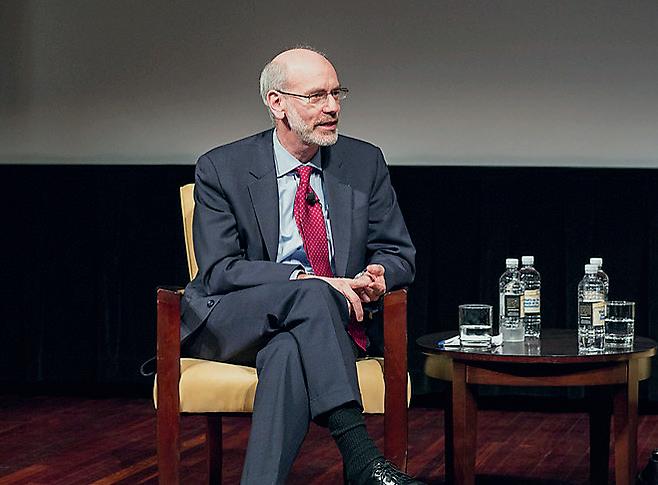
Stern’s path to the capital began at Vassar College in New York state, where he enjoyed rock climbing and studied ancient Greek. He graduated in 1983 before going on to Yale Law School.
A study of Vassar’s newspaper archives suggests young Stern was engaged in left-wing activism, sometimes under the auspices of a more neutral (or formerly neutral) institution.
Stern repeatedly appears on the masthead of a byline-free campus newspaper, Unscrewed.
In its initial October 1976 issue, Unscrewed called itself “a comprehensive, intelligent, and un-biased consumer re-
(Far Left) President Joe Biden at the White House on Jan. 11.
(Top
An office building housing the Penn Biden Center, one of the locations where Biden’s retention of classified documents was discovered, in Washington on Jan. 10.


port on the Vassar community and its surrounding environment.”
By April 1983, however, its mission seems to have drifted. It called itself an “intelligent political and consumer report.” One long article in that issue challenged President Ronald Reagan’s policy on Guatemala.
“They basically wrote to themselves,” a government lawyer said in a Jan. 11 interview with The Epoch Times. The lawyer, a Vassar student at the time, asked to remain anonymous because his job doesn’t allow him to speak with the press.
An editorial in Vassar’s conservative newspaper, The Vassar Spectator, claimed that the paper’s staff injected “liberal, if not radical views” into a publication ostensibly meant to inform ordinary student consumers on campus.
The anonymous former student believes the group used consumer advocacy as a pretense to advance far-left views.
Stern also battled campus conservatives as a member of the New York Public Interest Research Group (NYPIRG), a nonprofit co-founded by Ralph Nader.
In March 1980, the student body voted on a referendum that would have made students pay a $2 activity fee to NYPIRG unless they opted out. It failed.
The previous month, Stern had written a letter to Vassar’s Miscellany News lambasting the successful campaign against the then-upcoming NYPIRG’s referendum.
In it, he characterized a conservative student organization, Young Americans for Freedom, as a “right-wing national organization, fully supportive of Ronald Reagan, Nuclear Power and Military Aggression.”
It’s hard to imagine that Stern warmed to Reagan after graduating from Yale Law School and joining the American Civil Liberties Union (ACLU).
Indeed, as he pointed out in a Vanguard Law Magazine article from several years ago, Stern was with the ACLU during its landmark lawsuit against the Reagan administration, Armstrong v. Executive Office of the President.
The Executive Office of the President and the National Security Council had maintained that they could destroy
electronic records without violating the Federal Records Act, just so long as they had printouts of the material.
The D.C. Court of Appeals rejected that argument, ruling in 1993 that those printouts “may omit fundamental pieces of information,” including “the identity of the sender and/or recipient and the time of receipt.”
Yet, in a 1996 decision, the same court overturned the earlier conclusion about the National Security Council. It found that the council’s records were not subject to the Federal Records Act, meaning the council could destroy its emails.
Some worry that Stern’s zeal to make records public waxes when a Republican is in the Oval Office and wanes under a Democrat chief executive.
During the Obama administration, for example, Stern labored mightily to protect Financial Crisis Inquiry Commission records from Freedom of Information Act (FOIA) requests by Cause of Action, a conservative legal group.
Cause of Action wanted to get to the bottom of the Dodd–Frank Act, a piece of legislation championed by President Barack Obama and congressional Democrats over the objections of Republicans. It created the Financial Crisis Inquiry Commission.
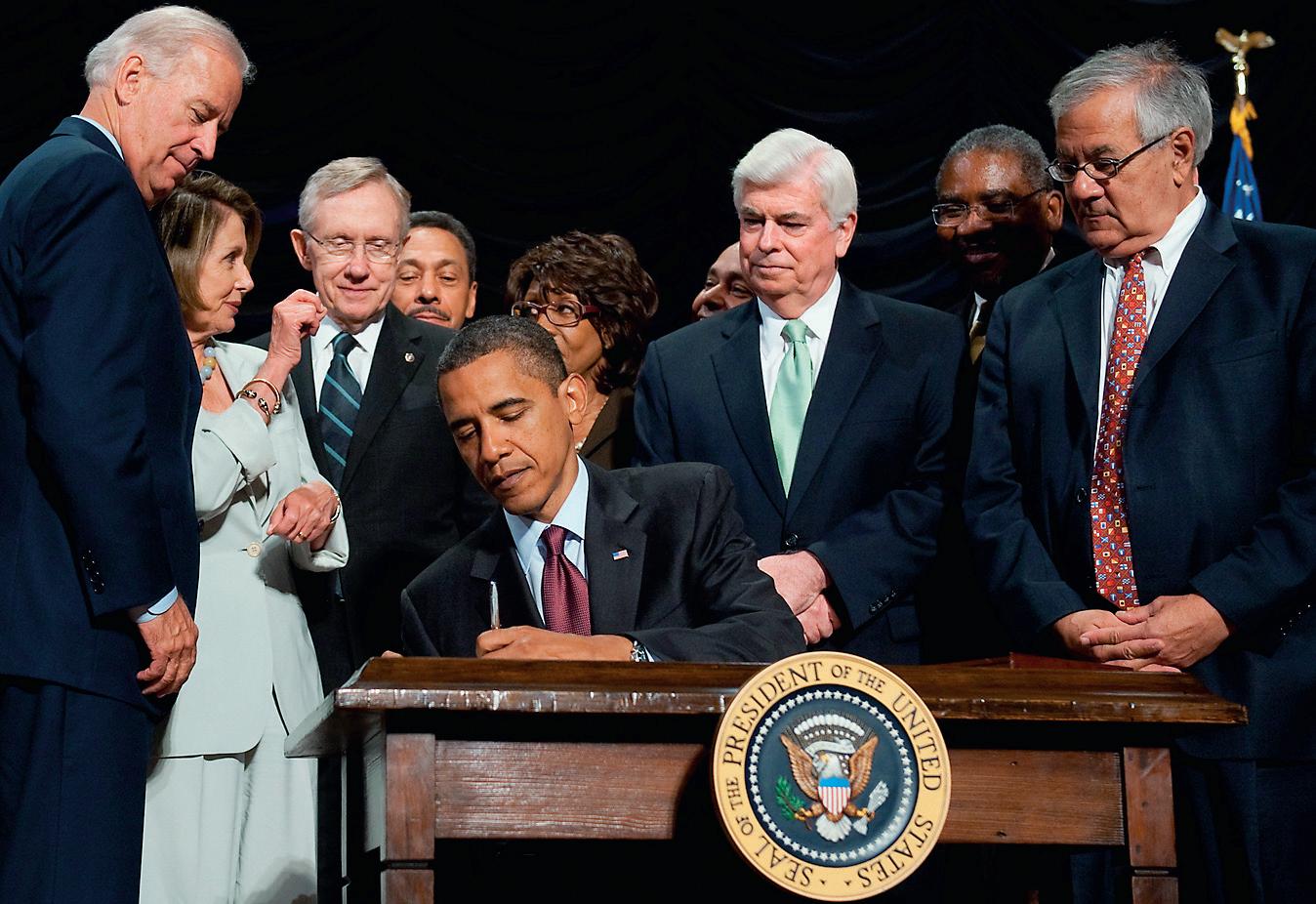
The House Oversight Committee’s then-top Republican, Darrell Issa of California, alleged that the body handled money poorly and employed staff closely tied to partisan Democratic politics.
The D.C. Appeals Court sided with NARA in jettisoning a Cause of Action lawsuit seeking access to the commission’s records.
NARA argued, among other things, that those documents were “legislative in character, and thus outside the reach of FOIA.”
Under the Obama administration, NARA had also pursued a new “Capstone Approach” to records management. They aimed to streamline and maximize the retention of “permanently valuable email of federal agencies.”
That emphasis on electronic records could raise questions about the true importance of physical records held by Trump.
“There is a concern that, without records management having a level of political accountability, it gets implemented in ways that may appear politically biased,” said Daniel Z. Epstein, a professor of administrative law at St. Thomas University in Florida.
Epstein spoke with The Epoch Times in a Jan. 15 interview.
As Cause of Action’s executive director during the Obama administration, Epstein testified before the Senate in 2015 that NARA had pushed back against his organization’s attempts to obtain documents related to then-Secretary of State Hillary Clinton’s private email server.
Emails from as early as 2012 obtained through FOIA requests by Cause of Action show concern among those at NARA about how Clinton handled records.
Reed Rubinstein, a Trump administration alum who now leads oversight and investigations for Stephen Miller’s America First Legal, told The Epoch Times in a Jan. 16 interview that the Biden administration hasn’t been a model of transparency.
In early 2022, for example, a broad coalition of groups focused on government transparency wrote to the Biden Justice Department asking for a clarification of its interpretation of FOIA. That letter said noncompliance from
the government is “at a decade-long high,” judging by the amount of active FOIA litigation.
Attorney General Merrick Garland issued FOIA guidelines the following month.
The Biden administration’s opacity “became immediately apparent upon their taking power,” Rubinstein said.
In August 2022, America First Legal made a series of FOIA requests to NARA. They wanted crucial records from Biden’s vice presidency, including any communications with his son Hunter and his brother James.
NARA denied expedited processing of the requests, prompting the firm to sue the agency the following month.
America First Legal also issued a FOIA request to NARA for documents related to the Mar-a-Lago search.
The agency is slowly releasing records in response to the many FOIA requests it has received.
Rubinstein questioned NARA’s referral to the DOJ.
“How can NARA make a referral when the Presidential Records Act doesn’t provide for that process?” he asked.
Rubinstein thinks there are “obvious anomalies’’ in how the agency went on to treat Biden’s records.
“The timing and the process are exceedingly strange and highly suggestive of damage control,” he said, speculating that the differences could boil down to politics.
Debra Steidel Wall has led NARA since May 2022, after archivist and Obama appointee David S. Ferriero retired.
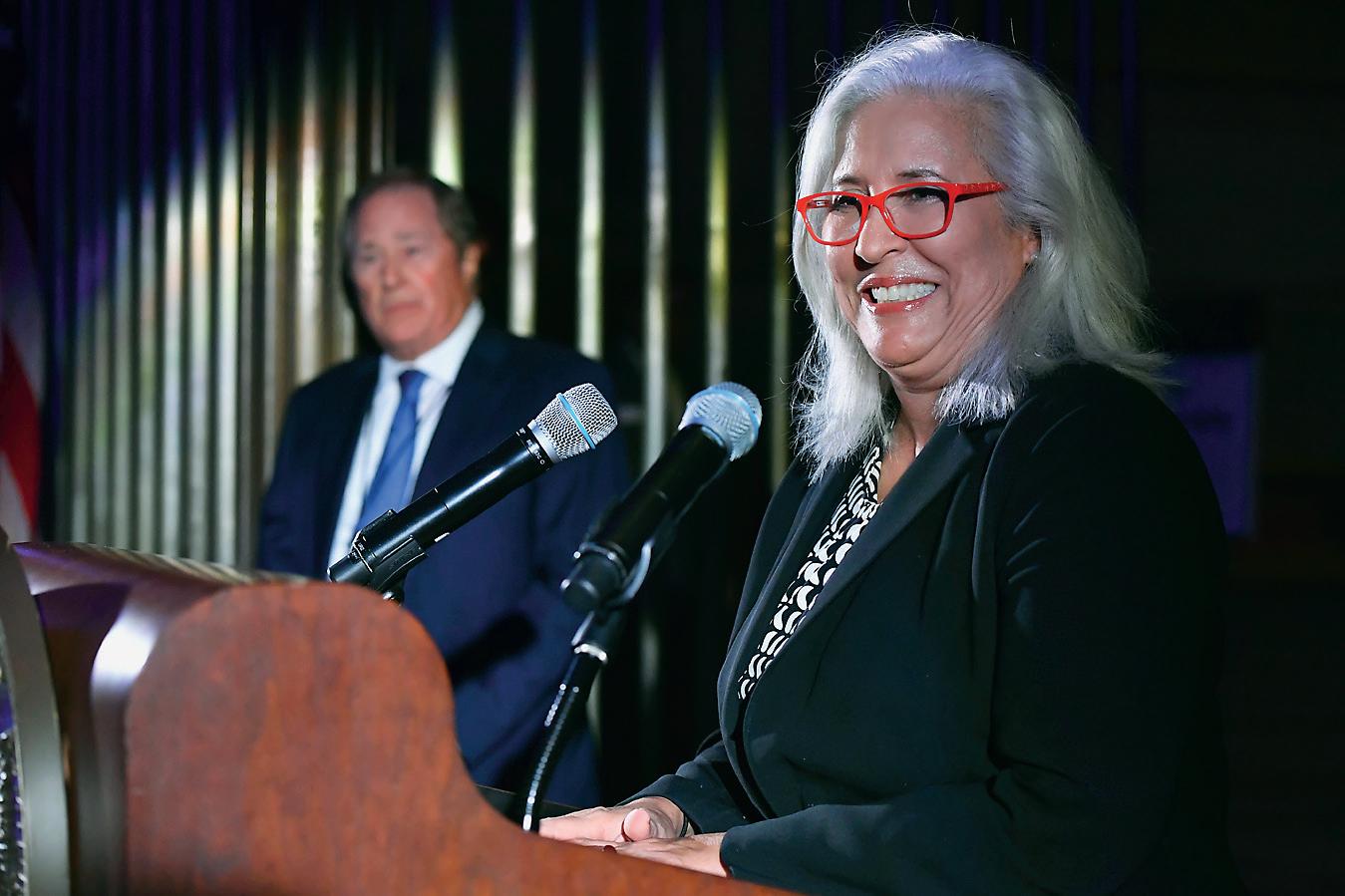
While Wall was in charge of NARA during both the Mar-a-Lago search and the reported discovery of Biden’s classified materials in November, her predecessor still led the agency when NARA made its referral to the DOJ regarding Trump’s documents.
Ferriero didn’t respond to repeated requests for comment from The Epoch Times about the timing of his departure and whether it had anything to do with the two unfolding documents cases.
In a memorandum made public under FOIA, Wall wrote that “the National Archives has been the focus of intense scrutiny for months, this week especial-
ly, with many people ascribing political motivation to our actions.”
“NARA has received messages from the public accusing us of corruption and conspiring against the former President, or congratulating NARA for ‘bringing him down.’ Neither is accurate or welcome,” she wrote.
Epstein noted that NARA hasn’t engaged in federal rulemaking, which ultimately flows through the White House Office of Management and Budget, to spell out when, why, and how it would refer a presidential records case such as Trump’s to the FBI.
That’s all the more striking in light of NARA’s response in the case of Biden’s vice presidential records.
Voters cannot directly unseat the bureaucrats charged with this sort of serious decision-making. Politicians come and go, but permanent Washington remains.
“If you’re going to have a federal bureaucracy, then the presumption should be that if they’re not making decisions via public regulations, then they’re engaging in political decisions,” Epstein said.
Davis, of the Article III Project, also worries about the politicization of the archives.
In that same document, Wall said she told Trump’s lawyer that his executive privilege claim under the Presidential Records Act had failed because “‘there is no precedent for an assertion of executive privilege by a former President against an incumbent President to prevent the latter from obtaining from NARA Presidential records belonging to the Federal Government.’”
We all know who Donald Trump is. But who is Debra Steidel Wall?
The official described some of her earliest ambitions in a 2011 article in The Suffolk Times. It was written shortly after she was appointed deputy archivist of the United States under Obama.
“When I first got here, I had no idea what the archives were. I was thinking of doing journalism or politics
“There is a concern that, without records management having a level of political accountability, it gets implemented in ways that may appear politically biased.”
Daniel Z. Epstein professor, St. Thomas University
or something like that,” she told that publication.
A glance at Wall’s master’s thesis at American University, where she studied silent film, may offer some insights into the political perspective that motivated her.

The words “feminism” or “feminist” appear 40 times in Debra Eve Steidel’s dissertation, “That Her Soul May Remain Pure: Women in American Silent Film.”
It’s hard to miss some value judgments in the future archivist’s prose.
At the turn of the 20th century, women were, in her words, “chained to home and motherhood.”
said, later warning of the need for what she called “adequate public investment.”
“The pressure on our supporters on the House Appropriations Committee to simply eliminate funding for programs has never been greater, but, because of you, we are hanging in there and working for a better outcome at the end of the process.”
She also described one of NARA’s major goals as “embracing the primacy of electronic information in all facets of our work”—an interesting prelude to the fight over Trump’s paper records more than a decade later.
Wall ended the speech with a quota-
By the 1920s, Steidel argued, a “new morality” had enabled young women to reach what she described as “sexual sophistication.”
Yet, “despite this outward emancipation, women in the twenties remained subject to the fetters of traditional morality and antiquated ideas.”
The film student also spoke in glowing terms of Margaret Sanger, co-founder of Planned Parenthood.
Sanger was “a radical Socialist and New York City slum nurse” who “balked at the ignorance and inequality perpetuated against poor women by the U.S. legal system.”
Steidel, now Wall, has alluded to politics in her NARA speeches.
In a 2011 address to a meeting of government archivists, Wall said her agency was “facing [its] own funding struggles,” citing Congress’s conflict with Obama over the debt ceiling.
Thanks in part to the Tea Party movement, Republicans had racked up a commanding majority in the House during the 2010 elections, setting up a fight over government spending.
“State and local records administrators and archivists have suffered disproportionate budget cuts far longer,” Wall
tion from Democratic President Franklin D. Roosevelt.
The acting archivist’s interests also shine through in a social media account she maintains under a pseudonym.
Photographs depict a protest over George Floyd’s death in police custody in 2020. The words “Black Lives Matter” and “No Justice, No Peace!” can be found beside more aggressively left-wing messages: “[Expletive] Blue Lives!” and “Workers Abolishing Police.”
An October 2010 photo album from Wall, from not long before she was named deputy archivist, chronicles Washington’s “Rally to Restore Sanity and/or Fear.” The event was hosted by liberal comedians Jon Stewart and Stephen Colbert, who then presented a parody of conservative TV and talk show personalities.
One poster she photographed reads, “Tea Party: Putting the ‘Dumb’ in Freedom.”
Another lengthy album documents Obama’s presidential inauguration in 2009.
A third album, dating to the final days of Obama’s second term in January 2017, depicts a trip to Vietnam, still run by the Communist Party of Vietnam.
The album cover is an image of a bust of Ho Chi Minh, flanked by a golden star and, on the left, a golden hammer and sickle.
The Nominee
Biden’s nominee for the nation’s archivist, Colleen Shogan, has a partisan history of her own.
In the mid-2000s, she worked for a moderate Democrat, former Sen. Joe Lieberman (D-Conn.), as he became a political independent.
Federal Election Commission (FEC) records show that Shogan, now senior vice president of the White House Historical Association, has been a prolific donor to Democrats and associated causes, including Hillary Clinton’s 2008 and 2016 presidential campaigns, Obama’s 2008 presidential campaign, and the Democratic donation tool ActBlue.
Yet, it is the Georgetown University
Data shows that people with an employer title that included ‘National Archives’ almost uniformly backed Democratic candidates and left-wing causes.
adjunct’s scholarship that has caught the eye of those concerned about partisanship in NARA after the FBI’s Mara-Lago visit.
A 2005 article co-authored with Joyce Gelb referred to pro-life activism as “anti-choice.”
The paper concluded that pro-life organizers did not take part in debates over abortion access at hospitals after mergers with Catholic medical institutions.
The authors speculated those activists might view it as “as too technical an issue”–one of multiple times the nominee has seemed to disparage the brainpower of conservatives in not-sosubtle terms.
Some of the most glaring examples appeared in her 2007 paper “Anti-Intellectualism in the Modern Presidency: A Republican Populism.”
One line in a section titled “Ronald Reagan: Ideologue and Anti-Intellec-
tual” referenced that president’s “less than impressive intellectual capacities.”
During her Sept. 21, 2022, confirmation hearing before the Senate Homeland Security and Governmental Affairs Committee, just weeks after the Mar-a-Lago search, Shogan repeatedly defended that language.
“I was trying to explain how certain presidents, very effectively through their rhetoric, were able to communicate with everyday Americans,” she told the committee’s ranking member, Sen. Rob Portman (R-Ohio).
“It’s a piece on rhetoric,” she told Sen. Josh Hawley (R-Mo.)
When Hawley asked her if her piece was nonpartisan, she replied that it was an academic article more than a decade and a half old.
In that same article, Shogan claimed that Reagan’s actions in response to violence and unruly protests in California’s
The Lead Washington
Then-President Donald Trump speaks to the press at his Mar-a-Lago resort in Palm Beach, Fla., on Nov. 22, 2018. In the eyes of many Republicans, the National Archives’ recent actions on the Biden classified documents case are at odds with how it treated the discovery of Trump-era documents.

higher education system “made it clear that students did not attend college for the sake of learning.”
Republicans also confronted Shogan on how the article described President George W. Bush. She had written that “during the 2000 campaign, it was widely accepted that Bush was less intelligent than his challenger, Al Gore.”
“In no way, shape, or possible [sic] do I think that President Bush is inferior intellectually or less intelligent. That is not the purpose of the article. It’s not stated in the article,” she told Portman when asked about the line.
“So the quote that I have that says, ‘It was widely accepted that Bush was less intelligent than his challenger, Al Gore’—that was not your quote?” Portman asked.
Shogan murmured before replying, “That was a characterization.”
Shogan told the senators that her successful working relationship with the Trump White House while in the White House Historical Association indicated she wouldn’t lead NARA in a partisan manner.
“You’re trying to present yourself here as nonpartisan. In fact, you’re an extreme partisan, and your record shows that,” Hawley said.
Sen. James Lankford (R-Okla.) asked Shogan about NARA’s involvement in the process that led up to the search of Mar-a-Lago: “Should this be a voluntary cooperation rather than a legal raid with a search warrant coming into a private residence?”
She answered: “As I understand it, when there is some concern about missing or damaged records in general at NARA, at that point in time, to retrieve the records, there is a voluntary exchange of communication with those individuals. And as I understand it—and once again, I don’t have any past knowledge of this—the vast majority
of the time, the records are recovered and retrieved.”
Lankford replied, “That has now set a new precedent—that going forward, this is going to be the new standard for every president after this.”
The hearing deadlocked in a 7–7 vote along party lines. Senate Majority Leader Chuck Schumer (D-N.Y.) can now move to discharge Shogan’s nomination, much as he did with Justice Ketanji Brown Jackson’s nomination to serve on the Supreme Court.
It’s much easier for a journalist to scrutinize NARA’s top leadership than its rank and file.
Low-level employees may not have much influence on the agency as a whole. Few, if any, are as visible to the public as Wall or Stern.
Some may wonder if left-leaning agency leaders aren’t representative of a less ideological corps of career government workers.
In truth, public data reveal little political diversity at the archives.
A search of FEC individual contribution data from 2022 shows that people with an employer title that included “National Archives” almost uniformly backed Democrats and left-wing causes.
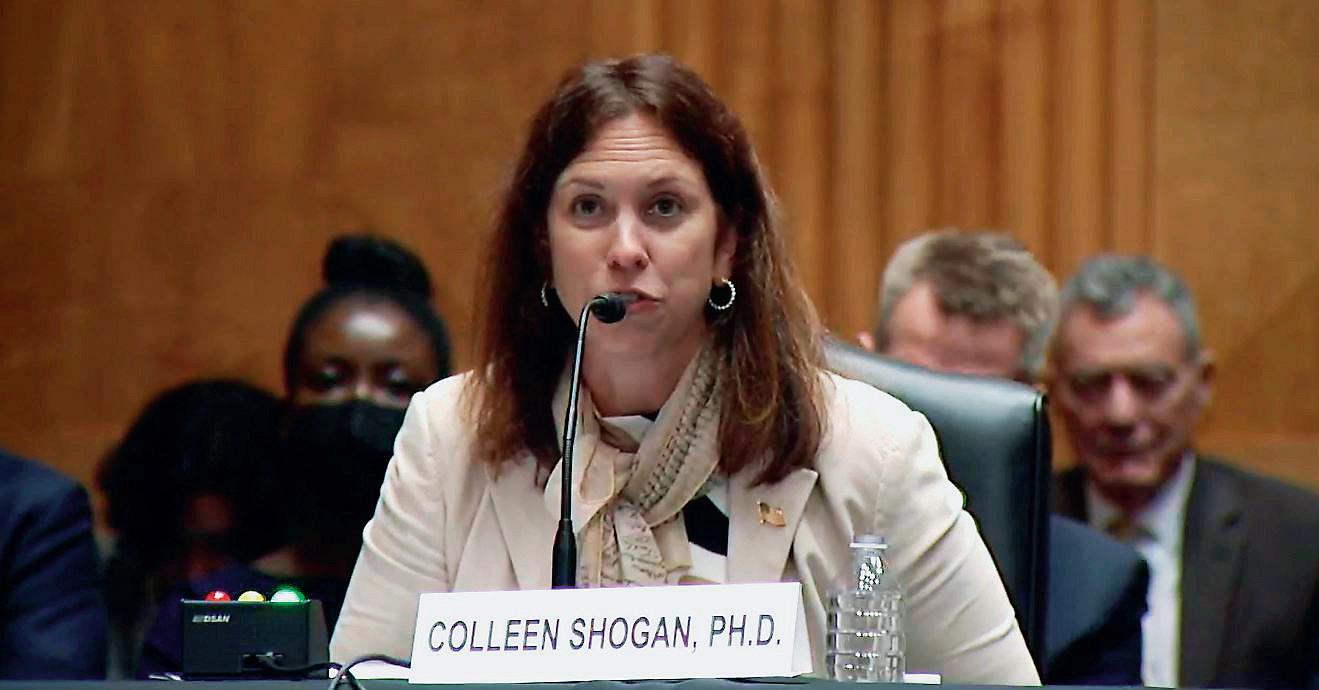
Raphael Warnock’s Senate campaign, the Democratic National Committee, and, of course, ActBlue all show up
again and again, alongside other familiar campaigns and organizations. By contrast, the Republican donation tool WinRed and other Republican or conservative causes appear only a handful of times.
Law professor Epstein was not exactly shocked by the FEC data.
He remarked that NARA staff who support Democrats are “voting consistent with their self-interest.”
“Democrats are going to keep their salaries much higher than Republicans would,” he said.
NARA is far from the only American organization charged with large-scale record keeping in which some have perceived bias.
The American Library Association, the world’s oldest and biggest library association, is led by self-described “Marxist lesbian” Emily Drabinski, whose major publications include “Queering the Catalog.”
Many of America’s public libraries have eagerly hosted drag queen story hour events. By contrast, pastor story hours have met with more resistance, as reported by The Epoch Times.
Megan Fox (the journalist, not the actress) has long documented evidence of left-wing bias in America’s public libraries.
In 2016, she and Kevin DuJan published “Shut Up!: The Bizarre War that One Public Library Waged Against the First Amendment,” which chronicles
her battle with the Orland Park Public Library, in part over what she saw as its resistance to transparency.
In Jan. 17 messages to The Epoch Times, she said the leftward drift of libraries can be traced back to the ALA, the same powerful entity now run by an admitted Marxist.
“They are a radical organization that is pulling all the strings,” she said, adding that her book describes “how it became that way and what citizens can do to fight it.”
Fox wasn’t surprised to hear of potential partisanship in NARA.
“Every institution is compromised,” she said.
If bias at our National Archives goes beyond the political views of the bureaucrats who staff it—if those individuals’ tendency to favor Democrats and left-wing causes influences their treatment of the executive branch—then the American people may have deeper questions about the institution’s ability to remain neutral in an increasingly politicized world.
Wall once described the archives as “the nation’s records keeper—in effect, our national memory.”
Its museum in Washington houses the Declaration of Independence, the Constitution, and the Bill of Rights.
In George Orwell’s dystopian novel “1984,” O’Brien paints a grim picture of just how much control a tightly managed party could exercise over information:
“We, the Party, control all records, and we control all memories. Then we control the past, do we not?”
The year 2023 isn’t “1984.” Yet for many Americans outside the Party, it may seem like the gap is narrowing.
“You’re trying to present yourself here as nonpartisan. In fact, you’re an extreme partisan, and your record shows that.”
Sen. Josh Hawley, to Colleen Shogan
Inmates listen to a police officer during a behavior training session at Chongqing Prison in Chongqing, China, in this file photo.

GOVERNMENTS WILL MAKE YOU POORER AGAIN FAIL TAX


Republicans support a new 30 percent national sales tax. 58
SANCTION CHINA FOR TAKING HOSTAGES

Beijing has arbitrarily detained up to 200 Americans. 59
There’s far more to the outlook than just a modest drop in inflation rates. 62
Republicans support a new 30 percent national sales tax
The principle that above all others has united the Republican Party since Ronald Reagan took it over from those content with permanent minority status for the GOP more than four decades ago is this: Taxes must be cut, especially the types of taxes that hamper generating lots of jobs in the U.S. economy.
“From America’s grassroots to the White House, we will stand united as a party behind a bold program of tax rate reductions, spending restraints, and regulatory reforms that will inject new life into the economic bloodstream of this country,” declared the 1980 Republican Party platform in language with which Republicans from Reagan to the Tea Party spawned by the election of Barack Obama to the most hardcore MAGA loyalist of today would be comfortable.
Far from exhibiting complacency after the historic 25 percent KempRoth income tax rate cuts during Reagan’s first term, in his second term, he signed a tax reform and simplification law that brought the top income tax rate down to 28 percent.
Now House Republicans may stage a vote on taxes that telegraphs to their enemies across the aisle, and to voters seeking candidates with credibility, that they no longer “stand united as a party behind a bold program of tax rate reductions.” Instead, to use the Democrats’ soundbite, as much a distortion as it may be, Republicans support a new 30 percent national sales tax on thousands of items that Americans of modest means have to buy every day, “from groceries to gas,” as President Joe Biden put it.
A floor vote on the “Fair Tax” was demanded by a handful of House
Republicans as one of the costs for their support of, or acquiescence to, Rep. Kevin McCarthy (R-Calif.) becoming speaker of the House of Representatives.
version never contacted him, which seems odd, considering Moore’s free market, low-tax bone fides and his decades of experience fighting the high-tax Washington establishment.
Critics of the Fair Tax point out that the disbanded army of IRS agents would be replaced by two new bureaucratic entities tasked with collecting levies on sales and excises. Plus proponents concede there would have to be major allowances and loopholes from the beginning—those politically motivated accretions that ultimately produced the “disgrace to the human race” that Reagan succeeded in reforming.
Worse still, unless the 16th Amendment, which rendered taxes on income legal, is repealed, a future Congress could bring the income tax back to operate in addition to the new national sales tax, which could morph into a European-style hidden value-added tax—all of which would be the worst nightmare of those seeking to constrain the taxman and shrink government.
Steve Moore, chief economist of The Heritage Foundation, who served as a senior economic adviser to former President Donald Trump, and before that was one of the architects of the original version of the Fair Tax, this week told The Epoch Times that Rep. Buddy Carter (R-Ga.) and the other House Republicans behind the current

Moore calls the current federal tax system “an abomination” and would love to abolish the income tax, which he regards as “one of the worst ways to collect taxes,” the scrapping of which he says would mean “every worker gets a big pay raise.” But today, he is concerned that a high-rate national sales tax would inevitably mean a large black market in the many goods subject to it. For both economic and political reasons, a flat tax geared to tax consumption rather than wealth seems preferable right now, according to Moore.
Another advocate for tax reform, Grover Norquist, president of Americans for Tax Reform and the originator of the ATR Pledge against voting to increase taxes, has for decades kept Republicans in elected office honest on the issue. Interviewed by The Epoch Times, Norquist posed a question to House Republicans promoting a national sales tax.
“What would you say to a couple turning 65?” Norquist asked. “They’ve spent decades paying income taxes and now when they’re not earning income, you are going to end the income tax, and as they look to spend their life savings, you will cut their savings’ value by 30 percent because everything they buy will now be subject to the national sales tax? You know, 65-yearolds tend to vote.”
“Fair Tax” versus flat tax may be a debate worth having, but with no hope of either idea being enacted under a Democrat-majority U.S. Senate and a Democrat in the White House, this is no time to stage a floor vote that can only hurt the cause of lower taxes and smaller government.
Economist Steve Moore is concerned that a highrate national sales tax would inevitably mean a large black market in the many goods subject to it.

Beijing’s arbitrary detention of up to 200 Americans
China’s co MM unist regime has wrongfully detained as many as 200 Americans, according to a nonprofit humanitarian organization cited by Reuters on Jan. 18. As the country ends its COVID-19 lockdowns and again tries to attract tourists and businesses, they should realize that it’s an exceedingly unsafe country.
U.S. travelers to Russia, Iran, North Korea, Syria, and Venezuela also take undue risks of arbitrary detention.
Beijing and its allies sometimes detain Americans on spurious charges, allowing them little contact with the outside world. Detainees have been denied access to their families, health care, and U.S. consular officials. They can be held in solitary confinement, tortured, and deprived of food and clothing unless families arrange for delivery.
The families of the detained are understandably distraught. They pressure U.S. officials to prioritize their loved ones, but officials have limited bandwidth to negotiate. They have other priorities.
With Russia, U.S. diplomats prioritize ending the war in Ukraine that has so far caused 200,000 casualties. The United States also prioritizes damping down inflation, which has arguably caused trillions of dollars in U.S. stock market losses. Keeping Russian oil flowing at below the $60 price cap is one anti-inflationary measure pursued by U.S. officials.
With China, the priorities are similarly peace and prosperity very broadly. The country does more than $650 billion in annual trade with the United States, and U.S. institutional investors had more than $2.3 trillion invested in China at last count. Many of those dollars profit major corporations with much more clout in Washington than the clout of family members of the arbitrarily detained.
Unfortunately for the detained, the risk of war between nuclear-armed superpowers, including over Taiwan and Ukraine, and trillions in global trade, usually take precedence over individual cases.
The prisoner swap of Huawei’s chief financial officer—who all but admitted committing fraud to cover up Huawei’s trade with Iran—for Canada’s “Two Michaels” was a victory for the detained and their families. The same goes for the work of a Russian illicit arms dealer for basketball star Brittney Griner.
deterrence in anticipation of prisoner exchanges. If the U.S. reaction to the hostage-taking of American innocents is the detention of their non-innocents, then subsequent prisoner exchanges are arguably not giving in.
We can arrest more criminals from the rogue nations that wrongfully detain Americans, so we have something to bargain with that we wouldn’t otherwise have. We can let rogue nations know we do this, which will deter hostage-taking in the first place.
Other countermeasures that don’t give in include confiscation of rogue state assets for compensation of the detained and imposition of tougher travel restrictions on these countries. The Biden administration has increased warnings to travelers about the risks of traveling to rogue states, but warnings are insufficient.
But these exchanges were failures for international norms. Suspected criminals got away because their terrorist governments took hostages.
The United States has a policy of not negotiating with terrorists. The more rogue states violate international norms, the more they resemble terrorist organizations. Giving into their hostage-taking is arguably giving into proto-terrorism.
If every time the United States captures a foreign fraud or arms dealer, the perpetrating country can arbitrarily detain an American, knowing it will pressure Washington to free the suspect, deterrence is undermined.
Less than six weeks following the Griner prisoner exchange, for example, Russia on Jan. 19 arrested another American on dubious charges.
Rather than an unending cycle of submitting to demands from Moscow and Beijing, Washington should increase
Guileless travelers keep visiting countries they shouldn’t, risking not only themselves but U.S. national security. When detained, the U.S. government must expend resources, including through possible policy concessions, to get their return.
Since 1961, the United States has imposed a travel ban on Cuba. We can and must gradually increase such bans on other rogue states. This would simultaneously provide more leverage to get detainees released and encourage economic decoupling from countries that don’t follow norms.
Tourists, businesses, and their dollars would be channeled to friendlier nations that support democracy, ultimately strengthening U.S. alliance systems.
To avoid rewarding hostage-taking, we can create new sanctions on China and its allies that explicitly link to the issue of arbitrary detentions. Those sanctions can be bargained with for detained Americans without offering concessions on existing issues. That way, we prioritize freeing detainees without giving in to terrorism.
Rather than an unending cycle of submitting to demands from Moscow and Beijing, Washington should increase deterrence in anticipation of prisoner exchanges.
MILTON EZRATI is chief economist for Vested, a contributing editor at The National Interest, and author of “Thirty Tomorrows” and “Bite-Sized Investing.”

ith the Federal Reserve committed to raising interest rates still further, the future of the housing market remains problematic.
The higher mortgage rates rise, the less affordable housing will become for the average American. Buying and building will accordingly fall even further than they already have. In time, however, a counter-trend will likely develop as potential buyers come to appreciate how residential real estate offers them at least a partial hedge against the effects of inflation.
They will accordingly stretch to buy, despite high financing costs.
So far, all the pressure has been on the downside. The Fed’s anti-inflation efforts have driven mortgage rates up to 6.5 to 7 percent at present from about 3 percent early in 2022. Because of this rise in financing costs, affordability, as tracked by the National Association of Realtors (NAR), has accordingly declined some 33 percent over the 12 months through November 2022, the most recent period for which data are available.
Homebuying has followed, falling 15.3 percent over this same time, as has new home construction, with starts of new dwellings falling some 22.4 percent. Not surprisingly, home prices have weakened as well. The NAR’s measure of median home prices is off 10.5 percent from its highs of last June.
This downward pressure will continue. Fed Chairman Jerome Powell has promised to keep raising interest rates for the foreseeable future. Of course, the Fed doesn’t aim to hurt housing. Its concern is the fight against inflation. But the pain to the housing market is an unavoidable
byproduct. No one knows how far the Fed will have to go, not even Powell. But he has made clear that the Fed’s current policies will remain in place until he and his advisers are convinced that inflationary forces have abated fundamentally.
That means several more rate increases. To be sure, these future rate boosts will come as less of a shock than last year’s and may be less extreme, so the additional downward pressure on housing will be less intense—but it will still weigh heavily.
own home, even if costly, fixes the cost of shelter, a major budget item. Whether they own their property free and clear or have financed it with a fixed-rate mortgage, they will enjoy no increase in their cost of shelter, no small consideration when the price of everything is rising.
But there’s more. History shows that residential real estate values tend to outperform other investments during inflationary times and rise ahead of inflation. That was certainly true during the last great inflation in the 1970s and 1980s. Even though inflation from 1970 to 1990 averaged a horrible 6.2 percent a year and occasionally rose above a 10 percent annual rate, housing values gained 8.7 percent a year on average for the entire 20-year period.
All could turn around quickly, of course, if, for some reason, inflationary pressure were suddenly to lift of its own accord—but that’s highly unlikely. History shows conclusively that inflation of the sort that the economy has suffered during the past 12 to 18 months lifts neither easily nor suddenly. Even if in the unlikely event that relief were to arrive quickly, the Fed, to be sure it had done its job, would hold its counter-inflationary stance for a while longer. That means that the rate pressure on housing will remain in place and likely build until the second half of the year at the earliest.
Inflationary concerns will, however, carry something of a counter-trend into the housing market. The longer such concerns last, the more potential homebuyers will realize how home ownership offers an attractive inflation hedge and buy despite elevated mortgage rates. One obvious factor is how owning one’s
Buyers will increasingly strive to avail themselves of the real estate hedge even as buying becomes less affordable. History shows that rather than give up on securing the inflation hedge; they will simply trade down along the price distribution, purchasing a smaller, less lavish house than they otherwise might have or one in a less desirable location. In this way, they secure the hedge against inflation that ownership provides at a price point that their income can support and do so despite higher financing costs. Commerce Department data show that such trading down has already started. A smaller percentage of new purchases are occurring at the high end of the price distribution than in, say, 2020.
It’s doubtful that this effect can overwhelm the downward pressure that rising interest rates will continue to place on buying and building. But the longer inflation persists, the stronger this counter-trend will become and the more it will tend to mitigate the otherwise negative influences on residential real estate.
The Fed’s anti-inflation efforts have driven mortgage rates up to 6.5 to 7 percent from about 3 percent early in 2022.
Inflation has been a major political headwind for the White House over the past year, and a new analysis by the Federal Reserve Bank of New York confirms that rising costs disproportionately affected low-income households, young Americans, and less educated individuals.
Economists at the regional central bank published two studies in January that assessed inflation disparities by income, age, race, and education. They found that those who spent more of their earnings on food, transportation, and housing felt the most amount of inflationary pain from early 2021 to June 2022.
The first report discovered that blacks, Hispanics, and middle-income households faced financial pressure as they dedicated more of their spending to transportation costs.
“This pattern is largely because a greater share of these groups’ expenditures is devoted to transportation, particularly used cars and motor fuel, categories that led the 2021 inflationary episode. However, over the last five months, as transportation inflation has declined, these gaps have declined as well,” the report authors said.
In June 2022, gasoline prices peaked at $5.01 per gallon, and since have tumbled 32 percent.
The used cars and trucks index surged at a peak rate of 27 percent last year. But recent inflation data show that the index plunged 8.8 percent year over year.
In a separate New York Fed report published on its Liberty Street Economics blog, inflation disparities were situated among young and less-educated Americans because they spent a considerable portion of their income on used cars and motor fuel.
This was exacerbated for households in rural areas where prices were generally higher than in urban communities, particularly for transportation
needs. But researchers concluded that many of these inflation gaps are narrowing as “transportation inflation converges toward average inflation.”
The latest Consumer Price Index (CPI) report found that new vehicles tumbled 0.1 percent month over month, used cars and trucks slipped 2.5 percent, gasoline declined 9.4 percent, and transportation services edged up 0.2 percent.
Still, low-income U.S. households endured “above-average inflation because of their higher proportional spending on food and housing, categories for which prices were rising more rapidly at the time.”

The bottom 40 percent of households by income were hardest hit as inflation became embedded throughout the national economy. New York Fed economists noted that low-income groups were affected because they couldn’t substitute cheaper goods and services, and maintained smaller cash reserves.
“As of December 2022, the bottom 40 percent have the highest year-onyear inflation rate of the three groups, and the inflation rate of the middle-income group is below the national average,” the report stated. “It is likely the case that the same rate of inflation represents a greater welfare loss for lower-income than higher-income households because of the former’s lower capacity for substituting to less-expensive goods, greater liquidity constraints, and larger marginal utility of real income.”
However, when it appeared that rampant price inflation had become more than “transitory,” White House officials and left-leaning economists suggested that inflation was only a problem for wealthy Americans.
Jason Furman, a Harvard professor and chair of the Council of Economic Advisers in the Obama administration, noted in a tweet that most of the economic issues plaguing the United States, including inflation and supply chain challenges, were “high-class problems.” This tweet was endorsed by Ron Klain, White House chief of staff.
Economist Paul Krugman, who writes a column for The New York Times, disputed the idea that inflation affects lower-income Americans.

“‘Inflation especially hurts the poor’ has truthiness—it sounds like it should be true. But I don’t see either evidence or a mechanism,” he wrote in a tweet in December 2021.
Others contend that inflation wreaks havoc mainly on the poor.
“High inflation, in short, tends to worsen inequality or poverty because it hits income and savings harder for poorer or middle-income households than for wealthy households. Households that have recently escaped poverty could be pushed back into it by rising inflation,” wrote economists Indermit Gill and Peter Nagle at the Brookings Institution.
Poor Americans more affected in 2021 and 2022, Fed reports say
Low-income U.S. households endured above-average inflation as a result of their higher relative spending on food and housing.ANDREW MORAN has been writing about business, economics, and finance for more than a decade. He is the author of “The War on Cash.”

There’s far more to the outlook than just a modest drop in inflation rates
The i nternational Monetary Fund has warned about the optimistic estimates for 2023, stating that it will likely be a much more difficult year than 2022.
Why would that be? Most strategists and commentators are seeing the recent decline in inflation as a good signal of recovery. However, there’s much more to the outlook than just a moderate decline in inflation rates.
Inflation is accumulative, and the estimates for 2023 and 2024 still show a very elevated level of core and headline inflation in most economies. The longer it remains this way, the worse the economic outcome. Citizens have been living on savings and borrowing to maintain current levels of real spending. But this can’t last for many years.
Politicians all over the world are trying to convince us that an annual inflation rate of 5 percent is a success when it’s actually a calamity.
In the current estimates, U.S. citizens will continue to lose purchasing power. According to the Bureau of Labor Statistics, “from November 2021 to November 2022, real average hourly earnings decreased 1.2 percent, seasonally adjusted.” However, these bad figures are nowhere as poor as those of the euro area. In the euro area, wages and salaries per hour worked increased by 2.1 percent in nominal terms in the third quarter of 2022, which means a staggering decline in real terms of 7.1 percent.

The outlook for 2023 is widespread impoverishment while governments continue to spend and raise taxes, which means an even worse destruction of real disposable income.
What’s happening in the so-called ‘recovery’ from the pandemic is nothing but a global destruction of the middle class at an unprecedented speed.
The worst policies have been implemented and all have decimated real savings and wages. Money printing and tax hikes haven’t made the rich poorer and they certainly haven’t damaged the wealthy. The entire negative impact of the widespread increase in taxes has fallen, yet again, on the shoulders of the middle class.
Politicians always sell their interventionist measures with the promise that they’ll only hurt the rich, but it’s you who pays. They know that the middle class is the one that depends on a wage and tries to save for the future. The ultra-rich are also highly indebted and can navigate a period of rising taxes by moving capital and looking for options to preserve wealth. Those who rely on a salary and a bank account are the ones that can’t escape the global policy of impoverishment.
We must remember the obvious: Artificial money creation is never
neutral. It negatively affects wages and savings in deposits and only benefits deficit-spending governments and the highly indebted. Rising taxes always hurt the middle class and make it more difficult for those who are starting to make a better living through hard work to invest and save for the future.
Interventionism always says that every unit of government spending goes back to society and therefore it’s positive. The concept makes no sense. Bloating bureaucracy and entitlement spending doesn’t strengthen growth or productivity and becomes a massive transfer of wealth from the productive to the unproductive. One thing is to have a portion of the productive sector aimed at social issues, and a completely different one is to put the “social” banner on any government spending and make the productive sector a cash machine for governments to tap into at any and every time.
When you buy the narrative that the government will give you free stuff by making the rich pay more, you’re opening the door for the government to consider you rich and take more from you.
When you demand more government, this is what you get: an extractive and confiscatory view that always blames those who invest and create jobs for the problems yet creates a larger bureaucracy to administer the so-called benefits you never get.
The interventionist narrative is to try to tell you that everything and anything is to blame for inflation except the only thing that makes all prices rise in unison: printing money well above demand.
Inflation at an annual rate of 5 percent isn’t a positive and certainly isn’t lowering prices. Inflation is accumulative, and what it means is we’re becoming poorer faster.
What’s happening in the so-called recovery from the pandemic is nothing but a global destruction of the middle class at an unprecedented speed.
Siberia is rich in natural resources including oil, gas, and rare earths

Xi Jinping and Vladimir Putin met virtually on Dec. 30, 2022, touting the usual and expected bilateral economic and political engagement, cooperation, and development between China and Russia.
But increasingly, one gets the sense that the marriage between Beijing and Moscow is one of convenience and necessity, not friendship. And Xi, the Chinese Communist Party leader, may slowly be gaining the upper hand.
Each country faces its own issues. Russia is mired in a costly and increasingly unpopular war against Ukraine. It faces international sanctions, and a sizable portion of its foreign reserves are frozen. Putin, its longtime president, has become persona non grata on the global stage.
China has more internal problems. We won’t detail all of the issues here but they’re urgent and span across the economy, the real estate market, rampant COVID-19 infections and hospitalizations, and escalating citizen unrest. Beijing is also believed to have ambitions of annexing Taiwan, and knowing the ramifications currently facing Russia, it must be prepared to face similar consequences including being cut off from global trade.
We’ve previously discussed China, Russia, and other nations potentially forming their own global reserve currency backed by commodities and/or gold. That would form another global trade hegemony and free China (and others) from having to transact in dollars. This would be helpful in a post-globalist, more regional economic and political paradigm, especially if China joins Russia as a global pariah.
China has also sought to secure its flow of natural resources. In late December 2022, Putin touted that
Russia has become China’s leading supplier of oil and gas. Almost 14 billion cubic meters of gas were sent from Russia to China during the first 11 months of 2022 between pipeline and liquefied natural gas. And thanks to the embargo on Russian oil by most of the developed world, Russia has replaced Saudi Arabia as China’s top oil supplier, and at a discounted price.
For the most part, Russia lacks pipelines to carry gas from Siberia to China or Europe. Siberia is historically underdeveloped with clusters of towns and cities, poor infrastructure, and inadequate transportation. As of December 2022, the “Power of Siberia” pipeline is now fully operational and can carry gas from Russia all the way to Shanghai, at a maximum of 38 billion cubic meters per year capacity by 2027. The Russian portion of the pipeline was completed in 2019.
Moscow has plans to build ‘Power of Siberia II’ to supply more gas to China, but it isn’t a strategic priority budget-wise given its war in Ukraine. With Moscow now fully distracted in its war in the west, China and Xi now have the upper hand in this uneasy marriage. While Xi has publicly supported Putin, privately, Xi has raised “concerns.” China also failed to appeal most Western sanctions against Russia and hasn’t provided the country with any military aid. It’s a bit of duplicitous diplomacy.
At this point, China is simply using Russia. Their relationship, despite today’s public harmony, has been an uneasy one for centuries. China and Russia often vie for hegemony over Eastern and Central Asia.
We’re projecting a bit here. But Russia has been among the top beneficiaries of Chinese development funding through the Belt and Road Initiative (BRI). China has now secured Russian oil and gas supplies. It benefits both nations for China to take over the development of Siberia, and Russia has very little wherewithal to challenge. China has allowed its BRI capital to dry up since the Ukraine invasion—fearing Western sanctions—but if China eventually is sanctioned itself, then the BRI would become a full go.
China craves more natural resources. Siberia has an abundance of oil, gas, coal, diamond, gold, iron ore, and rare earth minerals. Yet Russia has little capital and Moscow is too far to supply the necessary equipment. China is very close to Siberia.
Moscow needs the cash to sustain its costly war in Ukraine. Its economy is woefully undiversified and reliant upon energy and mineral exports. Russia needs China. China can provide the capital for development and take over Siberia; if not legally, then certainty in practice.
Moscow has plans to build “Power of Siberia II” to supply more gas to China, but it isn’t a strategic priority budgetwise given its war in Ukraine.FAN YU is an expert in finance and economics and has contributed analyses on China’s economy since 2015. IRINA YARINSKAYA/AFP VIA GETTY IMAGES
THOUGHT LEADERS
A big man, a big heart, and a warrior for speaking out when no one else will
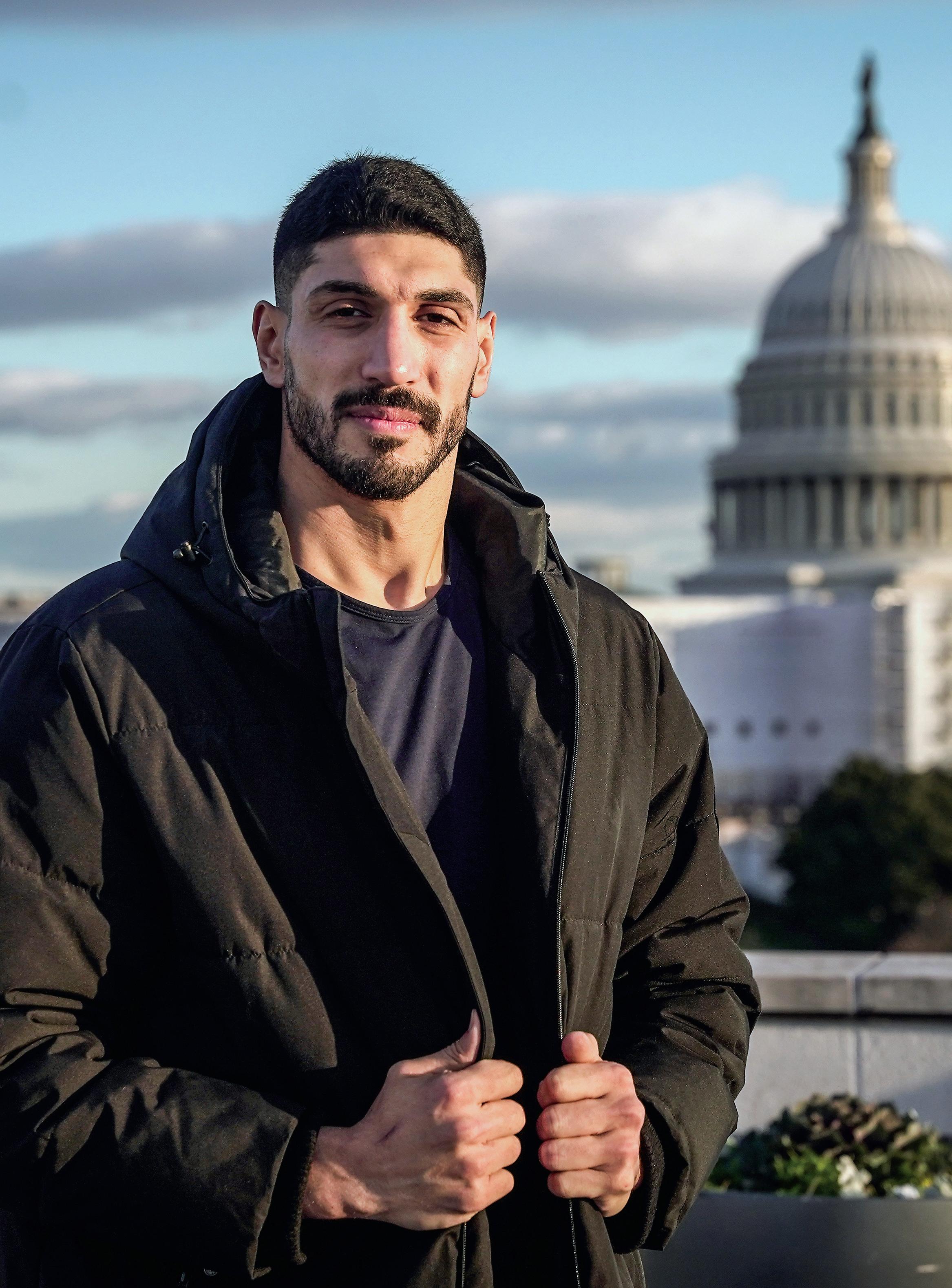 Former NBA player and human rights activist Enes Kanter Freedom in Washington on Dec. 18, 2022.
Former NBA player and human rights activist Enes Kanter Freedom in Washington on Dec. 18, 2022.
They’re pretty much trying to invade America from the inside,” Enes Kanter Freedom says of the Chinese Communist Party (CCP). “Because they know they’re not strong enough to invade America from the outside. By buying these people and organizations, they’re trying to destroy America from the inside. People are letting them because they’re bowing down to money and power.”
In a recent episode of “American Thought Leaders,” host Jan Jekielek spoke with the former NBA player, whose 11-season career abruptly ended when he made headlines for speaking out about human rights abuses in China. Here, Freedom reveals what made him the man he is today, and what gave him the courage to stand up to major multinational corporations and the CCP.
JAN JEKIELEK: Let’s talk about how we got here, because not too long ago, you were getting some great numbers in the NBA.
ENES KANTER FREE -
DOM: Soccer was No. 1 in my homeland, Turkey, and I wanted to be a soccer player, but because of my height and size, my teammates were always making me a goalie. So I decided to switch sports.
I was 14 when I started playing basketball. Five years later, I became an NBA player. My family wanted me to come to America to play basketball and get my education. I went to high school here. I went to college, and I’ve played 11
beautiful years in the NBA.
MR. JEKIELEK: You’ve been vocal about issues you see around the world, but it started with Turkey.
MR. FREEDOM: Until my second year in the NBA, I only cared about basketball and having fun with my teammates. And then in 2013, my third year in the league, there was a big corruption scandal in Turkey. President Erdogan and some of his family were involved. He started putting innocent people in jail—journalists, prosecutors, judges, and people who own media outlets.
So I put out a tweet. Because of the NBA platform, it became a conversation in the United States, Turkey, and some other countries. I was amazed that one simple tweet could affect so much.
I thought, from now on, I’m going to educate myself. So while my teammates were going out and having fun, I was studying things
happening between America and Turkey and in the Middle East. The more I studied, the more I realized I needed to talk about these issues.
I ended up writing an op-ed to one of the world’s biggest newspapers. I started to give interviews and meet with some people. And all this affected my family. My dad, a scientist, got fired from his job. My sister went to medical school for six years and still can’t find a job. My little brother, 12 years old, wanted to be like me, play in the NBA and represent his country and family, doing something he loved. But he was getting kicked off every team because of the same last name. My family was affected so much that they had to put out a statement saying, “We are disowning Enes publicly.”
MR. JEKIELEK: It seems clear why you were thinking about the reality in Turkey, but what turned you on
MR. FREEDOM: I was doing a basketball camp when this kid said to me, “How can you call yourself a human rights activist when your Muslim brothers and sisters are getting tortured and raped every day in concentration camps in China?” I was shocked. He called me out in front of everybody. The media was there, a lot of my friends, the kids, parents, everybody. I said, “I promise to get back to you,” and that day, I started to study. The more I studied, the more I was ashamed of myself.
From one topic, you jump into another. Once you focus on Uyghurs, another link pops up, and you click on what’s happening in Tibet. Then Hong Kong, Taiwan, Falun Gong, and Mongolians.
What I didn’t see was a celebrity. Athletes, singers, rappers, and actors all talk about Iran, Saudi Arabia, Russia, and North Korea, but when it comes to China, they’re silent. I was like, “Okay. I guess that’s my job now.”
MR. JEKIELEK: Why do you think there’s this deafening silence around the CCP?
MR. FREEDOM: Here’s an example from my story. The Celtics were playing the Knicks at Madison Square Garden on national TV. The whole country was watching. It was the perfect moment, and I put my shoes on. My topic on those shoes was “Free Tibet.”
A minute before the game, two gentlemen working for the NBA said to me, “You got to take your shoes off.” And I was confused. Two years

“One of my teammates said, ‘If you say anything against China, you’re never going to play again in this league.’”LEFT PAGE: PHOTO BY JACK WANG/THE EPOCH TIMES; THIS PAGE: KEVIN C. COX/GETTY IMAGES The shoes, with the words “SAVE UYGHUR,” worn by Enes Kanter Freedom of the Boston Celtics during a game in Atlanta on Nov. 17, 2021.
before, players were putting things on their shoes like “Black Lives Matter” and “I can’t breathe.” So I asked them, “Why?”
They said, “Your shoes are getting a lot of attention internationally. We’ve been getting a lot of pressure.” It was from China, but they didn’t say it was from China. I told them, “I’m not taking my shoes off, even if I get fined.” And they said, “We’re not talking about fines. We’re talking about getting banned.” I didn’t take them off, and in the first half of that game, I played zero minutes.
Back in the locker room, there was a notification on my phone from my manager, “Every Celtics game is banned in China.” That shows the dictatorship and the censorship and how scared they were. In that game, I played zero minutes, but I had played in every game before that.
Then the Players Association was calling me and saying, “You can’t wear those shoes ever again, because we’re getting pressure from the NBA.” Finally, I promised never to wear Free Tibet shoes again. The next game, I wore the Free Uyghurs shoes, and they called me, saying, “You lied to us.”

I told them, “I never lied to you. I never said, ‘I’m not going to wear Free Uyghurs shoes.’” At that moment,
they understood they weren’t going to be able to handle me.
After the Tibet game, one of my teammates said, “If you say anything against China, you’re never going to play again in this league.”
MR. JEKIELEK: It’s unbelievable to me the soft power that the Chinese regime exercises, even with such an iconic organization in America.
MR. FREEDOM: That was the thing that was driving me crazy. The biggest dictatorship in the world can 100 percent control an American organization and put pressure on them to fire an American citizen. But the NBA is not the only one. You see the same thing in Hollywood and Big Tech, in academia, on Wall Street, and in Congress.
They’re pretty much trying to invade America from the inside, because they know they’re not strong enough to invade America from the outside. By buying these people and organizations, they’re trying to destroy America from the inside. People are letting them because they’re bowing down to money and power. And the more I researched, the more I saw America is not the only one. Muslim leaders around the world speak out on
issues involving Islam or Muslims. But when it comes to Muslims in China, the Uyghurs, they’re silent. They’re scared of China and what China could do to them. Think about this. All these companies, organizations, athletes, and actors are standing up for Ukraine. All my Boston Celtics coaches went to a game with a Ukraine pin on their chests. But if China ever attacks Taiwan, would they wear a Taiwanese flag on their chests? Zero percent chance. That’s the hypocrisy. That’s what kills me inside, because they really don’t care.
MR. JEKIELEK: What’s your message for people in general, those kids at the basketball camp, or the audience watching right now?
MR. FREEDOM: We have one world. This is our home. So we‘ve got to make this world better together. I also say, “Listen, America’s not perfect, no country is perfect. But we are blessed and lucky to be in a country like this.” So be a good person. Educate yourself. Read. Reading is important. People are so focused on
games and smartphones and apps that they’re not seeing what’s happening in the real world.
MR. JEKIELEK: You changed your name to Freedom. Tell me, what does freedom mean to you?
MR. FREEDOM: When I first came to America, my teammates and I were in the locker room after practice. One of them had posted a criticism on Facebook about the president of the United States. I said, “You might be in jail tomorrow.” They all laughed and one of them said, “This isn’t Turkey, this is America.” Then they told me about the freedom of speech and religion here. It was like they were talking a different language. So later, I legally took that name, Freedom, and put it on my jersey. Every arena I went to, kids around the world watching that game saw the word Freedom. Now, every time I walk on the street, people see me and yell, “Freedom.” And that is so beautiful.
This interview has been edited for clarity and brevity.
“By buying these people and organizations, they’re trying to destroy America from the inside. People are letting them because they’re bowing down to money and power.”

Base self-pride on achievements, not ego
By Jeff MinickWhen the roM an Senate granted a triumphus to a victorious military commander, that celebration included a great procession of notables, captives of war, treasures taken from the conquered, musicians, and other entertainers. In a chariot near the end of the procession rode the commander himself. Beside him stood a slave, holding a gold crown above the great man’s head. Throughout this parade, it was the slave’s job to continually whisper in the general’s ear words to this effect: “Remember, all glory is fleeting.”
In 21st-century America, many of us want to hop aboard that chariot and wear that golden crown. What some of us don’t want is some guy murmuring cautions in our ears such as “ego is the enemy.”
In his book with that blunt warning as its title, Ryan Holiday writes: “One must ask: if your belief in yourself is not dependent on actual achievement, then what is it dependent on? The answer, too often when we are just setting out, is nothing. Ego. And this is why we so often see precipitous rises followed by calamitous falls.”
This pattern repeats itself again and again. Recently, for example, George Santos was elected to Congress by boosting his record through lies and fabrications. His actual achievements are few and small, trifles at best, but we can guess his ego is the size of
the Washington Monument. Crypto genius and billionaire Sam Bankman-Fried became a bank man who was indeed fried. His corrupt financial empire collapsed; he’s universally disdained as a villain; and it’s likely that his deceits and the contempt he showed for his investors were born of a massive ego.

It strikes me that two of the best tools for avoiding the snares of bloated self-importance are vision and humility. Vision entails the ability to assess a situation as it is, rather than as we wish it to be, while at the same time evaluating our capabilities as objectively as possible. Do we have the savvy it takes to open and operate that bakery we’ve dreamed of? What real skills and accomplishments can we bring to our post as a therapist? Pack up the ego, and we can answer such questions with confidence.
As Holiday points out time and again in “Ego Is the Enemy,” all of us can be victims, often unwittingly, of that self-focused voice in our heads. When we succeed, we may swell up with pride, often to our detriment—especially if the ancient Greek concept of hubris comes into play and subsequent failure leaves us flat on our faces. And when we do fall down, that same interior voice can rip us apart all day long. One way or the other, the ego is managing us rather than vice versa.
Of the individuals Holiday studied who kept their egos in check and attained their objectives, he notes: “They were grounded, circumspect and unflinchingly real. Not that any of them were wholly without ego. But they knew how to suppress it, channel it, subsume it when it counted. They were great yet humble.”

Humility goes hand in hand with this ability to see beyond ourselves, yet that quality of self-effacement, which has been considered a virtue since ancient times, has today gone missing in action. We have only to look at our last three presidents to understand that this is so. Barack Obama, Donald Trump, and Joe Biden brought very different personality traits to the Oval Office, but no one would hold them up as paragons of humility.
It’s simple, really. When we temper our desires for honors and recognition, or our fears of failure, we can better evaluate and address whatever task is before us. Manage the ego, and we can better manage our lives.
When we succeed, we may swell up with pride, often to our detriment.
Viewed as either toys or industrial tools, drones are both and a lot more. They provide an up-close view of things you normally could never observe.

THE FOUR SEASONS HOUSTON has many delightful dining, shopping, and unexpected charms within that just might keep you from leaving to see the rest of the city. 72
AFTER YEARS SPENT HONING his skills under New York’s best chefs, Travis Swikard now celebrates local seafood and vegetables in his hometown restaurant. 75
TURN OFF THE TV AND the phones, gather the family in the living room, and bring back the tradition of game night with these classics. 79
 By Phil Butler
By Phil Butler
This Tuscan-inspired estate is a unique property located in close proximity to Tampa and Saint Petersburg
When Most people think of Florida homes, a Tuscan farmhouse on the Gulf of Mexico isn’t the first image that springs to mind, making this property all the more impressive. Located in an exclusive area of Tierra Verde island on the Pinellas County side of Tampa Bay, the massive 12,000 square-foot, three-level residence has seven bedrooms, plus eight full and three half baths. Inspired by the simple elegance of Tuscan farmhouses, the owners traveled to Italy to research and then create their vision.

Set on a waterfront lot just under a full acre in size to ensure privacy, the owners and guests enjoy an unobstructed view of barrier islands and the Gulf of Mexico. The residence has excellent curb appeal, with its landscaped driveway and massive exterior walls crafted of limestone shipped from Italy that perfectly accent the terracotta tile roof.
Inside, the home features soaring ceilings, solid mahogany doors, exposed Douglas fir beam ceilings, wood and Italian tile flooring, and a limestone staircase built with stone


from the Burgundy region of France. The main level’s open floor plan connects a living room to a casual dining area in the restaurant-grade kitchen, an adjacent living room, a formal dining room, two rooms used as offices, and a luxurious master suite. The residence also features a wine cellar, a very well-equipped gym, several storage rooms, and a three-car garage. The six guest bedrooms and baths all feature large windows accented with villa-style solid-wood window treatments. The oversized master suite is a restful sanctuary with a large lounging area, a balcony to enjoy the scenery, and a resort-style bathroom with a tiled walkin shower and a separate large jetted bathtub.
An al fresco dining area looks out over the water and the saltwater lap pool heated by an energy-efficient geothermal system. A walkway leads past a circular moat surrounding a fire pit through mangroves to the boat dock, which is a great place to launch kayaks to explore the nearby barrier islands.
Phil Butler is a publisher, editor, author, and analyst who is a widely cited expert on subjects ranging from digital and social media to travel technology.
• 7 BEDROOMS, 8 BATHS
• 12,000 SQUAR E FEET
• 0.97 ACRE S
KEY FEATURES
• NO FIXED-BRIDGES GULF ACCESS
• EXCLUSIVE
NEIGHBORHOOD
• HEATED SALTWATER POOL
AGENTS
PREMIER SOTHEBY’S INTERNATIONAL REALTY ROBYN GUNN, GLOBAL REAL ESTATE ADVISER
+1 727-421-7234
Some hotels are so captivating that you never even have to step outside
 By Tim Johnson
By Tim Johnson
Believe M e, i had plans. Striding to the floor-to-ceiling windows in my executive suite at the Four Seasons Houston, the downtown skyline spread out at my feet. So much to see. So little time.
But here’s the thing—travel days often unfold very differently from what we had planned. And the best ones? Those go completely off the rails. This would be one of the latter. Standing there at the window, feeling the energy and dynamism of The Bayou City surging up at me, I never imagined I wouldn’t take one step outside.
That’s right: I never left the hotel. It wasn’t a weather thing—torrential rains or high winds didn’t keep me inside. And I had a number of cool options for tours and attractions. It certainly wasn’t some sort of personal challenge, either, like in the 2000 indie movie “Waydowntown” where a group of office workers make a bet on who can stay inside their interconnected offices, condos, and food courts for the longest.
In truth, I just got busy. Because I found plenty to keep myself occupied inside the hotel, which sits in the heart of downtown and just completed a major, multimillion-dollar renovation. The updates transformed the guest rooms and suites as well as the lobby, creating “Houston’s living room.” They also added a secret special feature—a place where I ended my night. More on that later.

After a hearty, Texas-sized breakfast, I made my way down to the Topgolf Swing Suite, the first simulator of its kind. Now, I’m a terrible golfer. And here, I had a chance to (virtually) hack my way through some of the world’s greatest courses. It didn’t go well, my ball veering—just like in real life—deep into the fescue. I switched games to one where you take a hockey stick and shoot on a net—a sport I’d played fairly well in my youth.

I made a few shots and left satisfied. Time to explore the city. Just about to emerge from the front door to complete a self-guided tour of Houston’s downtown, I bumped into the hotel’s GM. He mentioned that the hotel hosts a resident magician, who performs periodically. Would I like to go? Of course. When is the show starting? Well, right now.
I got the last seat in the house. This wasn’t the kind of magic you’d find at a kid’s birthday party. Ben Jackson’s shows are almost always sold out. It’s a Saturday dress-up affair, an occasion.
IAH is about 16 miles from Four Seasons Houston and downtown. Bandista has four Jewel of the South house cocktails.
“This is an evening of sophistication. We bring together art, science, even engineering and design,” the besuited magician told me during a quick chat before showtime. He did his first trick at the age of 15 and was hooked. Today, this is the No. 1, top-rated show in the city. I’d soon see why—his sleight of hand simply wowed everyone in the crowd.
Staying in the hotel afterward, the hours just slipped by. I sipped bourbon at the backlit bar of Bayou and Bottle, where they serve 180 different whiskies. At one point, I popped by the Krigler boutique, just off the main lobby, and the heir to a storied perfume legacy just happened to be standing there, behind the counter.
The company dates to Berlin and Moscow in the second half of the 19th century and has created bespoke scents for movie stars and royalty all over the world. For Ben Krigler, it’s simply the family business, with secrets and recipes handed down for five generations.

“It’s like a family of chefs, passing on their knowledge,” he said. “Except, where they made cakes and soups, we made perfume.” We chatted for some time, and I eventually walked away with a bottle of the good stuff, a cologne made especially for King Hussein of Jordan.
Dinner time arrived, and I feasted at Chef Richard Sandoval’s Latin steakhouse, Toro Toro. Moving from a swordfish dip to a super-tender wagyu, dipping into lobster Mac and cheese on the side, I decided to skip dessert. Because I knew something more was just ahead.
After my final bite, a server met me at the table, then led me through a darkened, empty
dining room. We arrived at a wall that was covered in bookshelves. Without a word, she found a small, tucked-away keypad.
The wall swung open. This was Bandista, the hotel’s gilded, invite-only speakeasy. Walking through the secret door, it felt like I was emerging from a time machine. “The inspiration here is the ‘tequileros’ who brought agave-based liquor across the border during 1920s prohibition,” bartender Jennifer Allbritton explained to me as she poured a flight that included tequila, rye, and cognac. “We have fun with it, give it a Latin twist.”
I looked at my watch. Midnight was approaching. I hadn’t made any bets on staying inside, like the character in the movie. But still, I felt like I had won. A whole day inside, complete with surprises, a drink in front of me, and even a little magic.
Fly: George Bush Intercontinental Airport (IAH) is connected to major cities around the world.
Getting Around: Houston’s public transit system includes light rail and buses. Of course, you won’t need to get around, if you don’t plan on leaving the hotel!
Stay: The Four Seasons Houston sits within walking distance of most downtown attractions, but it’s also a fine place to settle in and enjoy.
Take Note: Bandista isn’t open every night— for details (and maybe an invite), inquire with the concierge.

For the star San Diego chef, who left Daniel Boulud’s New York kitchens to open a CaliforniaMediterranean restaurant in his hometown, the beauty is in the process.
By Crystal ShiCrowning the open kitchen of Callie, in San Diego’s East Village, is a sheet of glowing, rust-colored steel that comes to a point in the center—like the bow of a ship, said chef-owner Travis Swikard. Working each evening service, “I stand right there, and it’s me at the helm of my ship coming home, bringing back everything I have with me.”
There’s some precious cargo onboard.
Culinary school in New England and a stint in London; a decade working under revered French fine dining chef Daniel Boulud in New York; and a lifetime of dogged hard work, attention to detail, and rabbit-hole-diving curiosity have all led to Swikard’s debut restaurant, opened in June 2021. Here, fine-dining finesse meets surfer-dude casual, and the Mediterranean flavors he fell in love with during his travels meet his hometown’s homegrown abundance.

Swikard had his heart set on a culinary career since childhood. But he credits his mentor chef Gavin Kaysen with first showing him its true potential: “an endless opportunity for growth and knowledge for the rest of your life.”
“He was able to get into my head at a young age that you need to build a great, strong foundation—learning your tools, how to sharpen your knife, where the fish comes from,” Swikard said. Build a 1-by1 foundation, Kaysen told him, and you’ll be set up for a 1-by-1 house. But build one “that’s 10
Swikard spent a decade working for Michelinstarred French fine dining chef Daniel Boulud before striking out on his own.
Local vegetables and seafood shine in what Swikard calls Callie’s “light, bright, clean” CaliforniaMediterranean cuisine.

The spacious interiors, swathed in golden-houresque light, include nods to Swikard’s upbringing such as a “breaking wave” over the bar and banquettes inspired by skatepark rails.

Age: 38
Comfort Food: Ramen from Menya Ultra
Underrated
Ingredient: “I’m somewhat of a tahini freak.”
Last Meal: “At a round table surrounded with people that I love. Good conversation, a bunch of laughter, and great wine.”
feet deep [and] wide, and you can build the Empire State Building—the sky’s your limit.”
Those understandings were reinforced during a training trip to Japan, which left him in awe of the depth of technique behind the most deceptively simple dishes. Take the nuanced, multi-step process of preparing hirame, a type of flatfish, from proper butchering to hand-plating: “At the end, it’s a bite of umami like you’ve never had before—and there’s nothing on the fish. But the only way you get there is knowing everything that gets you there; you can’t just buy the fish and cut it open. It really made me fall in love with that process of trying to express the best of that ingredient.”
With that approach, and San Diego’s unmatched bounty, it’s no wonder that every dish at Callie sings.
“There’s no better place in the world to have a restaurant that is ingredient-focused,” Swikard said. For his vegetables, he works with local farmers “120, 180 days out, planting lettuce from seeds” for the next season. Seafood arrives still breathing from local fishermen; he might not know exactly what he’ll get until the morning of, but “I know exactly where it’s coming from, how it was caught, the guy that pulled it out of the water.”
He’s excited to explore new opportunities here—catalyzing the city’s burgeoning food scene, expanding his skillset and capacity as a restaurateur, and stepping into a mentor role himself, helping his team members build out their foundations, too. Callie is only “the first brick” atop his own, he said. “I’ve got a long way to go.”

If you need to get an up-close look at a far-away object, a drone is the solution.
The next best thing to having a helicopter to enjoy the view from above is a drone

Is a drone a tool used by the film industry and the military for specialized tasks or is it a toy similar to a radio-controlled airplane? The short answer is “yes.”
Drones have revolutionized filmmaking by providing an easier, much less expensive way to film scenes from above without the need for a plane or helicopter. The military uses drones the size of small aircraft to monitor far-away areas and sometimes to launch an attack without having to send a pilot into harm’s way. Searchand-rescue organizations use drones equipped with infrared cameras to find lost hikers. These devices are also popular with regular folks, but the most common questions asked are, “Why would I get one?” and “What can I do with it?” As it turns out, there are many answers to these questions.

Drones can be found for less than $100 or more than $5,000. The difference lies in quality and abilities, because with these little aircraft, you often get what you pay for. A $50 starter drone will often have very limited flight times due to the battery used and some may not have a camera. Drones are operated by means of a remote controller, which in some cases could be a cellphone. In most cases, the more basic drones aren’t particularly durable, especially when crashed. Some very small ones can be
used indoors, but consider how pets may react and don’t allow children to use them without basic instruction or adult supervision—four sharp, rapidly spinning blades demand respect, even from a “toy” drone. A basic drone can be a fun way to learn the basics, but the limited fly time may soon become annoying. Stepping up to a model with a better battery, or better yet, easily replaceable batteries provides more flight time.
Drones are sometimes compared to radio-controlled (RC) model helicopters that are designed to look like real helicopters. But unlike RC helicopters, some drones are equipped with a GPS system to find specific locations and to automatically return to the takeoff spot when the battery goes below a set level. A major difference is the requirement for all drone operators whose equipment weighs more than half a pound to register their equipment with the Federal Aviation Authority (FAA).
Recreational users—defined as someone who doesn’t use the drone for
Drones range in price from $100 to more than $5,000, with more expensive models featuring high-definition

A growing number of companies are exploring the use of drones to deliver packages to consumers and retrieve items in warehouses.

Many drones are used solely for recreational applications such as making personal videos or competing in organized races.

Biologists used a drone to fly in and collect samples of nasal mucus expelled from humpback whales.
business purposes, is at least 13 years of age, and is a U.S. citizen—need only to successfully pass a test of basic safety requirements and obey flight rules in order to register with the FAA.
Recreational drone pilots can use drones to inspect home roofs as a business, take photos for a school website, provide volunteer aerial monitoring of nature sites, and other uses defined by the FAA as noncommercial on its website (FAA.gov), while those flying for commercial purposes need to earn FAA certification. Commercial pilots are held to higher standards and must adhere to a very strict set of rules and regulations but are allowed to deliver packages, dispense chemicals over agricultural areas, and a host of other uses.
For casual users, a drone provides a birds-eye view of their home and neighborhood. A drone is a good way to observe wildlife that may not be feasible to approach, taking care to not disturb them. Others seek out drones with a “follow me feature” that can track them from a pre-determined distance to obtain video as they take part in activities such as running, hiking, kayaking, walking the dog, or myriad other action activities. Many home or building inspectors rely on drones to get an up-close view of windows, a roof, or a tower that isn’t easily accessible.

See things from a hummingbird’s perspective
Simply put, drones are a great way to go where a human can’t safely roam. One very unique example took place when investigators wanted to explore the abandoned operations building in Nikola Tesla’s Wardenclyffe Tower in Shoreham, New York. Because the building is contaminated with dangerous mold, humans can’t enter it, so a drone was sent in to view and record current conditions. In another example of a novel use of a drone, a team of National Geographic-sponsored biologists used a drone to fly in and collect samples of nasal mucus expelled from humpback whales in Alaska when they surfaced and exhaled.
Recreational drone pilots need to mind their manners; flying over a neighbor’s yard or used to peek into windows of multistory buildings isn’t acceptable and can quickly lead to legal issues. Additionally, in most cases, drones can’t be operated within five miles of airports, near or over military facilities, near flying aircraft, at altitudes above 400 feet, near flying or nesting birds, or in or above certain wildlife sanctuaries. A full list of no-fly zones can be viewed at FS.USDA.gov.

Starter drones priced under $100 have short flight times and limited features, but are a great way to learn the basics of flight.
There are strict FAA rules and certification requirements for commercial-use drones, with no drones being allowed to interfere with aircraft or flying birds.

Flying over a neighbor’s yard is definitely rude and possibly illegal. Likewise, it’s never appropriate to use a drone to spy on outdoor sporting events or concerts, or along roads where they could distract drivers.

$300
Backgammon’s origins can be traced back 5,000 years to games created in Mesopotamia, with the game now known as Backgammon first recorded in 17thcentury England. This magnificent set features a matte-finish ebony wood case with silver-tone hardware, glossy chips, and two sets of dice with which players can test their strategy, luck, and dice-throwing skill.


$699.90
One of the world’s oldest and most beloved games with a European history that dates back to 15th-century Spain and France, chess is a game that can be enjoyed by all ages for a lifetime. This deluxe, heirloomquality, tournament-grade set features metal playing pieces sized and designed to be easily grasped and moved across the beautifully detailed black or walnut-finished board.
$149
It has been estimated that, at one time, most U.S. households had a Scrabble game because it’s a fun way to hone math and spelling skills. This L.L. Bean edition features a classic design on a rotating base, a raised grid to hold tiles in place, and storage under the board to hold the tiles, the sand timer, and other accessories.

$269.95
CLUE GAME

This magnificent edition of the classic game of Clue allows your family to host—and solve—a murder mystery in the comfort of your living room. Did Colonel Mustard do it? Was the murder weapon a candlestick? Answer these questions and more as you maneuver across the gold foil-stamped game board above 3D mansion rooms holding clues.


$119
First introduced in 1959, Risk has become a family favorite because it hones a player’s strategic thinking skills as their army wages war across the globe. This all-new edition, which is ideal for those who know the game well, as well as new fans, features solid wood game pieces, special 60th anniversary graphics, redesigned cards, and a deluxe folding game board.
Are there books you’d recommend?
We’d love to hear from you. Let us know at features@epochtimes.com
This week, we feature a children’s adventure about a battle against an evil rat and an inspiring play about Romans taking on power-hungry Caesar.
‘The Terminal List’
By Jack CarrThis novel launched the story of a more lethal type of Jack Ryan character. Navy SEAL James Reece discovers the American government had his entire team terminated. He creates his own list to terminate. Rarely has a debut novel garnered such attention and acclaim.

ATRIA/EMILY BESTLER BOOKS, 2018, 416 PAGES
suffering poor around him. His enemy, a police lieutenant who believes in an earthly paradise, finally catches the priest when he drops his guard to hear the confession of a dying murderer. This masterpiece about faith, pity, and mercy is as relevant now as when it was written.
PENGUIN CLASSICS REISSUE, 2015, 240 PAGES
‘Skirts’
 By Kimberly ChrismanCampbell
By Kimberly ChrismanCampbell
a passionate painter. One of his favorite subjects is the versatile bird: the chicken. In this beautifully illustrated book, Pépin shares his philosophy of living, which includes sharing his love of food and art with family and friends.

HARPERCOLLINS, 2022, 256 PAGES

In revolutionary, anticlerical Mexico, a nameless “whiskey priest” is on the run from the authorities. A man given to human frailty—he once fathered a child—the priest is torn by his instinct for survival and his compassion for the
 By Meredith Hindley
By Meredith Hindley
“Casablanca” was one of the 20th century’s greatest movies. The movie evokes romance, espionage, and adventure. World War II Casablanca, a city in Morocco, proved as exciting and intrigue-filled as the movie. Morocco was a French protectorate, a kingdom with its own government. France treated it as a colony, creating complications as the war impinged on the city. This book details the wartime actions and events affecting Casablanca, perfect for those who like intrigue-filled history.
PUBLICAFFAIRS, 2017, 512 PAGES
In an age of sexual confusion, it’s pleasant to find a book devoted to celebrating clothing defining femininity, unabashedly and unapologetically. It’s a history and an appreciation of the dress, in all its forms. There’s a chapter on every major dress type of the 20th century, defining the style and presenting its history and impact. The book fits the dress into a larger context, showing its role in history and today’s society.
ST. MARTIN’S PRESS, 2022, 254 PAGES
‘Cato: A Tragedy’
By Joseph Addison
‘Redwall’
By Brian JacquesThis first volume in the 22-book “Redwall” series tells the tale of an abbey where the brother mice and a young hero, Matthias, battle to preserve their community against an evil rat. Young readers will love this story. Ages 8 and up.

FIREBIRD ILLUSTRATED EDITION, 2002, 352 PAGES
Known for his culinary expertise in the kitchen, acclaimed French chef Jacques Pépin is also
First performed in 1713, Addison’s play about virtue and liberty in the last years of the Roman Republic remained popular for decades. George Washington and other American patriots drew inspiration from the story of Cato the Younger and his attempts to resist the power-hungry Julius Caesar. Though the play is unsuited to the modern theater, readers can discover in it the passion for freedom and liberty that so aroused the Founding Fathers. Accompanying this text are 32 Addison essays related to the themes of the play.
LIBERTY FUND, 2004, 308 PAGES
‘Bear Snores On’
By Karma Wilson and Jane ChapmanAdorable illustrations and humorous verse depict a cave in winter in which Bear slumbers away. Meanwhile, a mouse seeks shelter in his lair, then a hare, and others, until quite a cozy gathering collects. Will Bear snore on through?
MARGARET K. MCELDERRY BOOKS, 2002, 32 PAGES

This week, we feature a classic 1950s drama about a group of troubled teens and an inspiring sports flick about a wannabe football player.

In this animated tale based on a book by author Terry Pratchett, scrappy feline Maurice (voiced by Hugh Laurie) joins forces with a piper and a group of talking rats to realize his dreams (and schemes) of striking it rich. However, once they make it to the town of Bad Blintz, their plans go awry.
With a bevy of great voice actors and excellent computer-generated animation, this is an enjoyable movie that should appeal to both kids and adults. It’s filled with light peril, whimsical humor, and some genuinely touching moments.

ANIMATION
Release Date: Feb. 3, 2023
Directors: Toby Genkel and Florian Westermann
Starring: Hugh Laurie (voice), Emilia Clarke (voice), David Thewlis (voice)
Running Time: 1 hour, 33 minutes
MPAA Rating: PG Where to Watch: Theaters
urban teen angst of the post-war era and features an ideal cast in gutsy performances.
DRAMA
Release Date: Oct. 27, 1955
Director: Nicholas Ray

This drama follows Jim Stark (James Dean), a teenager whose family has just moved to Los Angeles. Jim has issues with
his parents but finds solace in 16-year-old Judy (Natalie Wood). However, trouble soon arrives in the form of Judy’s rough-andtumble boyfriend. This powerful film deals with the
In this charming indie from director Sofia Coppola, Bob Harris (Bill Murray), a washed-up movie star in the midst of a midlife crisis, is on an advertising job in Tokyo. In the hotel bar, Bob meets young Charlotte (Scarlett Johansson), who’s going through her own challenges. As both feel lost in life, the two form a genuine friendship that helps to ease each other’s angst. Fortunately, this quirky comic drama never devolves into
GOING FOR BIG A DREAM
sentimentality, mainly due to natural dialogue, earthy acting, and the chemistry between its stars.
COMEDY | DRAMA
Release Date: Oct. 3, 2003
Director: Sofia Coppola
Starring: Bill Murray, Scarlett Johansson, Giovanni Ribisi
Running Time: 1 hour, 42 minutes
MPAA Rating: R
Where to Watch: DirecTV, Redbox, Vudu
Starring: James Dean, Natalie Wood, Sal Mineock
Running Time: 1 hour, 51 minutes
Rating: PG-13
Where to Watch: DirecTV, Amazon, Redbox
In the tough manufacturing suburb of Joliet, Illinois, college-aged Daniel E. “Rudy” Ruettiger (Sean Astin) has aspirations of playing football for the University of Notre Dame. However, his grades and athletic talent aren’t strong enough and prove to be obstacles he must face in order to realize his big dream.

This biographical sports drama about the real-life Rudy Ruettiger features great acting and a hopeful message
about never giving up on one’s dreams, despite whatever challenges one faces.
BIOGRAPHY | DRAMA | SPORT

Release Date: Oct. 22, 1993
Director: David Anspaugh
Starring: Sean Astin, Jon Favreau, Ned Beatty
Running Time: 1 hour, 54 minutes
MPAA Rating: PG
Where to Watch: DirecTV, Vudu, Redbox
ON MAY 25, 2017, The Epoch Times published an article headlined “Despite Allegations, No Evidence of Trump–Russia Collusion Found.” The article detailed that—despite a media frenzy at the time—no actual evidence had been uncovered that President Donald Trump or anyone associated with his campaign had colluded with Russia to influence the 2016 presidential election.
OUR REPORTING was proven accurate with the conclusion of the investigation by special counsel Robert Mueller.
NOT ONLY DID WE NOT BUY INTO the false narrative that Trump colluded with Russia, but we have also been a leader in reporting on the irregular and apparently politicized nature of the FBI’s investigation of the Trump campaign. During the past five years, we have published dozens of articles on the topic, many of them exclusive.
FOLLOWING THE 2020 ELECTION, The Epoch Times was at the forefront of investigating and reporting on the questions surrounding the integrity of the election. Through our fact-based and independent reporting, we were able to uncover multiple irregularities.

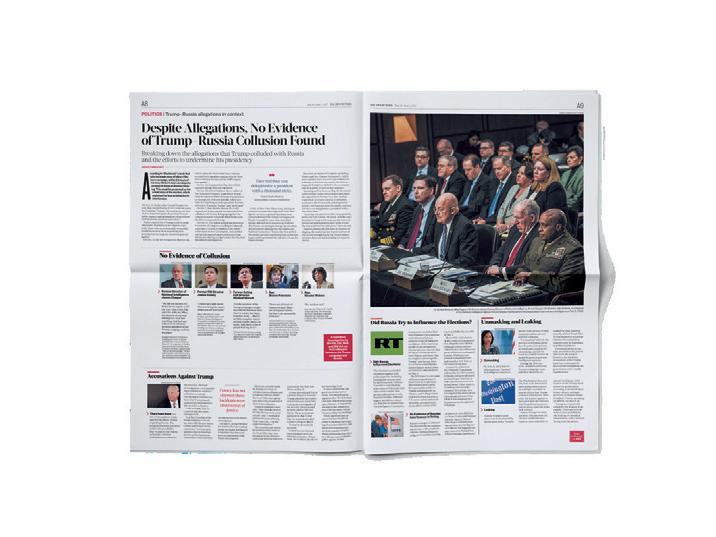
ON APRIL 15, 2020, The Epoch Times published its documentary
“Tracking
Down the Origin of Wuhan Coronavirus.” The film, which received over 100 million views, explored the origins of the virus, including the possibility of a lab leak. It presents scientific data and interviews with top scientists and national security experts.

YEARS AFTER THE RELEASE of this groundbreaking documentary, the possibility of a lab leak is considered by government officials and experts as the most likely explanation for the virus's spread.
SINCE ITS INCEPTION in the year 2000, The Epoch Times has been at the forefront of reporting on the infiltration of the United States by the Chinese Communist Party. Numerous times over the years, we've broken major China-related stories ahead of other news organizations.
In 2003, The Epoch Times was the first media outlet to systematically and continuously report on the spread of SARS, well ahead of most other Western media. We were also the first to report on state-sponsored forced organ harvesting in China—one of the most underreported atrocities of our time—in

which prisoners of conscience are killed for their organs, which are then sold for profit on a large scale.
THE EPOCH TIMES also published the editorial series
“Nine Commentaries on the Communist Party,” revealing the true nature and history of the Communist Party and inspiring a movement that so far has seen more than 400 million Chinese people quit the Party and its affiliated organizations. Another of our series, “How the Specter of Communism Is Ruling Our World,” systematically exposes the evil nature of communism, as well as the harm it has brought and continues to inflict on the United States and the world.
We believe that investigating and exposing the truth is the only way that we can remain safe and free

Every word we type, whether in an email, a text message, or a post to a forum or website, lives forever. Following a few simple etiquette rules before you hit Enter can help ensure you won’t regret what you said.
By Bill LindseyAll words and photos posted online live forever. It can be appealing to create a bold online persona for a personal account, but it’s best to just be yourself. Use the mom or grandma test before posting anything: If you wouldn’t want either one of them to see it, don’t post it. Never make any disrespectful online comments about co-workers, bosses, or former romantic partners— even if they are true—and don’t reveal anything shared in confidence.
It’s easy and fun to send or respond to positive comments on social media or work-related accounts, but when tempted to post or respond to negative comments, follow the adage of “If you don’t have anything nice to say, don’t say anything.” There’s nothing to be gained by being rude, clever, or antagonistic when making a comment or responding to one. You won’t change anyone’s mind, but you may be painting an image of yourself as pompous or ill-mannered.
Any time you are sending personal or business messages via email, text, social media pages, or messaging apps, stop before sending to take the time to review spelling, grammar, and punctuation. Atrocious spelling, the misuse of apostrophes, slang terms, and other gaffes are sadly very common and can provide a less-than-flattering impression of you or of your business to those with whom you are communicating. Slow down to make sure all is well before you hit the Enter key.
Unless you’re Elon Musk, don’t post your personal photos or opinions on a work-related account. It’s reasonable to assume 50 percent of all those who see your posts will disagree with them, so don’t risk inadvertently losing existing or potential business customers. It’s best to not post too much personal information on a personal account, because it could be used by password hackers or criminals seeking unoccupied homes, who now know you’re away on vacation.
Emoticons are OK for personal messages to friends but should be avoided in business communications. On a similar note, friends might enjoy your sense of humor, but others might be offended by something typed in jest. Political, social, and religious topics can be minefields, so be careful about sharing your opinions or leanings. When writing for the general public, do so at a fourth-grade reading level to ensure everyone who reads it can easily comprehend it.
